#i try to keep some level of consistency in how i write these characters (emphasis on try)
Explore tagged Tumblr posts
Text
shoutout to that one mtdd confession comic i drew last year that i never posted because uhh
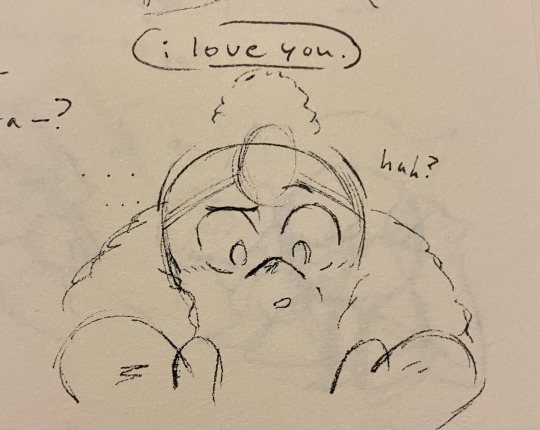
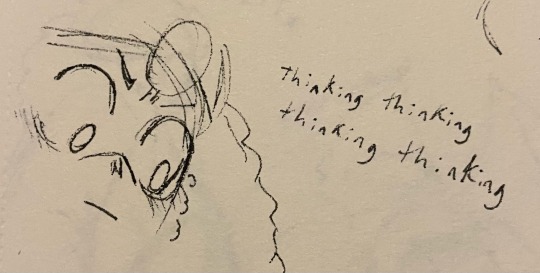
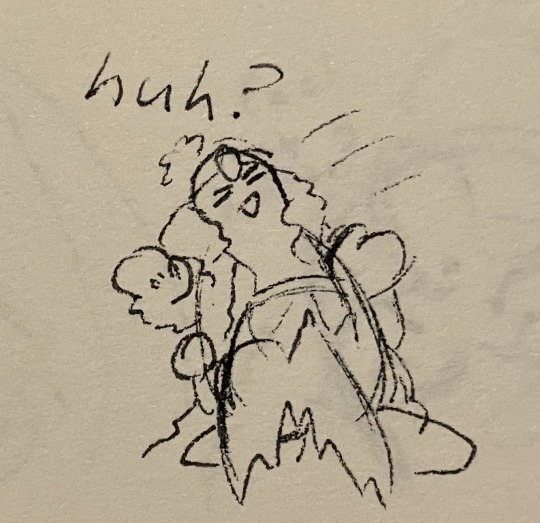
it was unscripted so the ideas were pretty disjointed and it showed a lot. anyway:
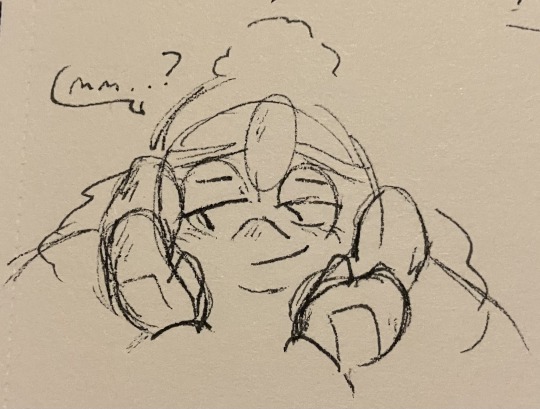
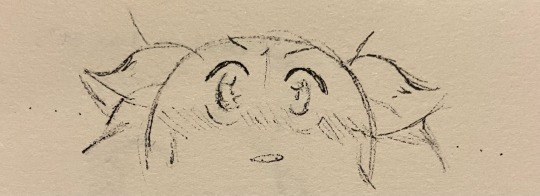
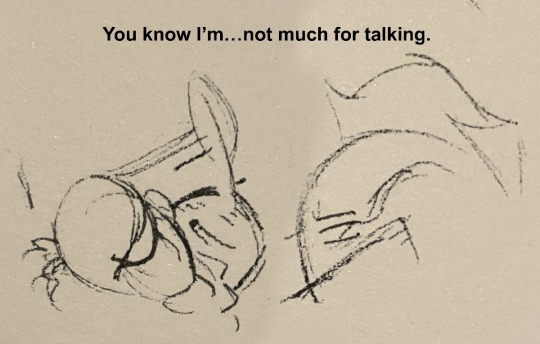
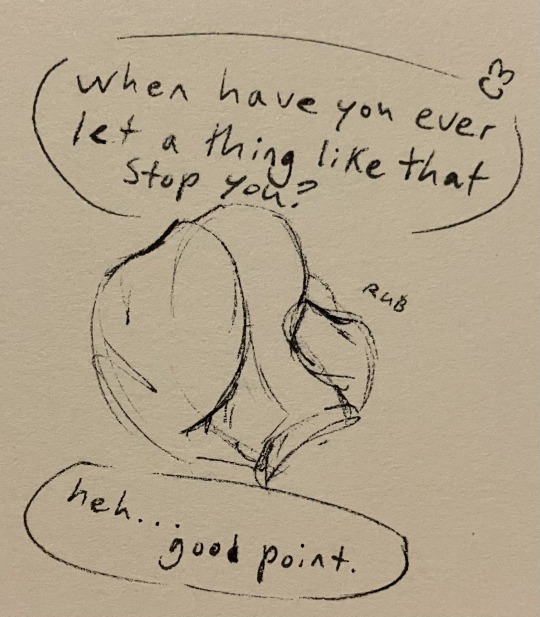
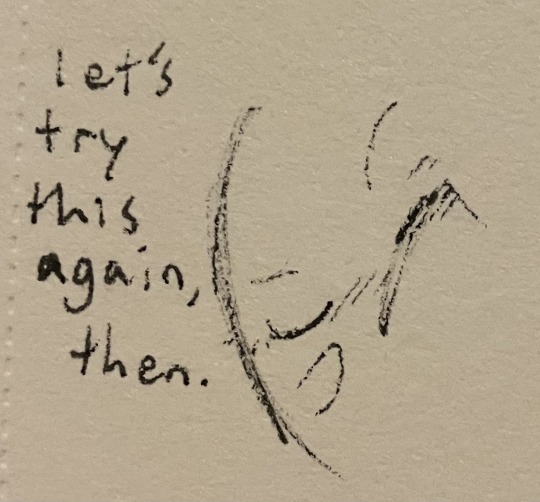
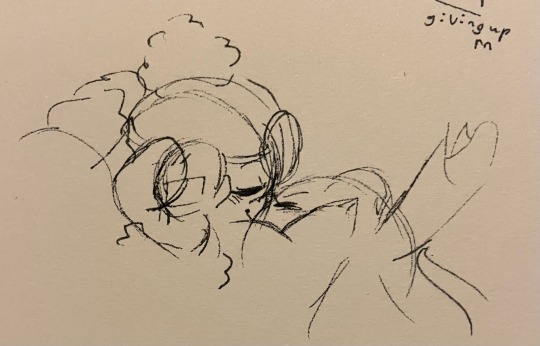
#i rewrote it but im honestly still trying to figure out what’s missing#this isn’t the whole thing but the other panels kind of add nothing to the idea anyway so uhh#i redrew so much and just couldn’t be satisfied and then. well. 10 months went by#maybe i’ll return to the second one…eventually…#kirbyposting#my art or something#meta knight#king dedede#metadede#quinn does comics#yeah im just clearing out old wips what of it?#yknow the two cakes thing#this might be more of a cupcake lol#or i guess it’s literally half baked#but that’s okay#the point a to point b was really awkward so i am literally skipping the middle#i try to keep some level of consistency in how i write these characters (emphasis on try)#so this isn’t canon to my little made up universe#a scene like this is important of course!! which is why i want to do it justice…ish. and so i don’t hate this but it’s not a good fit#if that makes sense
50 notes
·
View notes
Note
hey! 8, 12, 14 for thg sleepover saturday? <3
hi!!!! thank you for the ask and designing such a lovely set of questions 💜💜💜
8. Do you have any thoughts on how the Career training programs work?
do I ever
to keep this from getting enormous, generally speaking I think it depends a lot by district, but there’s a mix of kids going in who need the financial support and the food that training has to supply to keep them strong with kids whose families signed them up for the social advancement and prestige that comes with being a victor. I think the focus of training varies a lot between 1, 2, and 4 just because of the specific skillsets and images the tributes and victors from each district have, but I think pretty universally there’s an almost equally heavy emphasis on athleticism and for lack of a better word, etiquette? constructing your image, presenting yourself well, because an enormous part of the Games is gaining sponsors and playing up your assigned angle, and that level of calculation isn’t necessarily going to come naturally to a kid. in an uglier sense, I think a large part of training is also grooming the kids for trafficking. it’s probably worse in 1 and 4 but I imagine it’s rampant and there’s a lot of abuse perpetuated against the kids while they’re in training.
I will take this opportunity to direct everyone to Serafina if they want to see more of my take on this
12. Do you enjoy THG modern AUs? Why or why not?
heavily depends on the AU but overall yes. canon constrains a lot of the relationships in very specific ways and changing the setting lifts some of that. also, I enjoy seeing people’s creativity and people get really inventive with modern AUs, I’ve read some in settings that suited all the characters so well that I would’ve never dreamed up. and I like the ones I’ve written okay too lol, it’s just a challenge to maintain some elements of the backstories when translating to a modern setting but it’s something I enjoy trying to write my way around
14. What is your stance on the relationships between the victors? Are they a found family? Do they hate each other? Is it somewhere in between?
I don’t think by any stretch of the imagination they’re a full found family, or if they are, it’s very small groups of them. I don’t think victors from different districts really form relationships with each other unless they’re being trafficked together. I don’t see how they would, travel seems extremely restricted so they would be able to consistently see each other only once a year during the Games, calls and letters are probably monitored so it’d be hard to get past a surface level of acquaintanceship, and I don’t know if any of them would really want to extend the effort. I think there’s probably mixes of pity and compassion and concern and begrudging respect between them all depending on everyone’s specific situation, but also we know some of them are pretty hostile towards each other. there’s probably a lot of jealousy from different directions towards each other, particularly from trafficked victors towards those who have been left mostly alone.
sleepover Saturday (thg edition)
3 notes
·
View notes
Note
Do you think Jason Todd fandom is kinda toxic? Because it seems like NO MATTER what DC do, there'll always be complains. Forget the bad adaptation like Titans. Even Judd Winick cannot escape the criticism with how he potrayed Robin!Jason. They just never satisfied.
SORRY, IT TOOK ME SO LONG TO RESPOND TO THIS. I just moved from Washington D.C. to Seattle, which, for my non-American friends, that's 4442km away. And I DROVE THERE ALL BY MYSELF. And now I'm trying to find new work in a new city and trying to stay mentally healthy and positive. Life is exciting but hard and scary.
*sighs*
As someone who was a fandom elder with V*ltr*n. I've seen some of the worst when it comes to fandom behavior. I'm talking people baking food with shaving razors and trying to give them to the showrunners. I'm talking leaking major plot details and refusing to take it down unless they make their ship canon (I am looking at you, Kl*nce stans) For the most part, DC Comics has had a decades-long reputation of treating their fans like trash and not caring what they think so from what I've seen, we all just grumble and complain in our corners of the internet about how we don't like how X comic portrays Jason Todd.
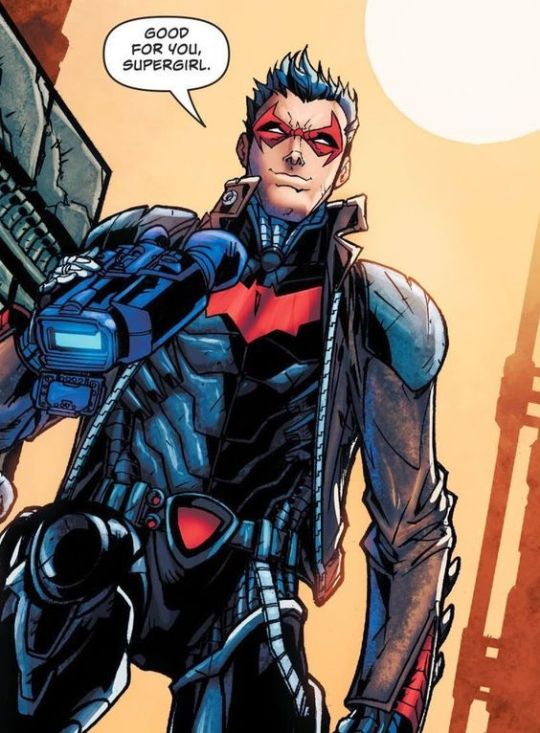
The challenge with Jason Todd is that he's your clinical anti-hero, the batfamily's Draco in Leather Pants, he's a jerkass woobie, and on top of all of that, he's a Tumblr sexyman. It's a perfect storm for a very fun but frustrating character to be a fan of. It doesn't help that every writer decides to re-invent the wheel every time Jason comes up so his canon lore is confusing at best and inconsistent as a standard.
I guess starting with a general brief on who Jason is and what is uniform about him with every instance he's appeared in comics/media.
Grew up in a poor family in Gotham with a dad who was a petty-mid-level criminal, and a mother who dies of a drug overdose.
Survives on the street on his own by committing petty crimes and potentially even engaging in sexual acts to keep himself alive.
Is cornered by Batman and taken in after Dick Grayson quits/is fired
Becomes the second Robin, but is known for being the harsher, more brutal Robin.
Is killed by Joker after being tortured, but somehow comes back to life and regains senses through the Lazarus Pit
Resolves himself to be better than Batman by basically being Batman but kills people.
Where there has been a lot of conflict in the fandom is the fact that Jason Todd is not a character that is written consistently. DC Comics loves to go with the narrative that Jason was "bad from the start" and was the "bad robin" when, yes, he has trouble controlling his anger, but he also still is just as invested in seeing the best of Gotham City and trying to be a positive change for the world as any other DC Comics hero.
Where I get frustrated with the fandom is its ability to knit-pick every detail of a comic they don't like while completely disregarding everything that makes the comics great and worth it to read. My example being Urban Legends. To which most people had pretty mixed reactions to. I was critical of the comic at first but as it went along I ended up really liking it. I have a feeling DC Comics went to Chip Zdarsky and told him he had 6 issues to bring Jason back into the Bat Family, and honestly he didn't do a bad job. Did it feel rushed? Absolutely. I wish there was more development of Jason and Bruce's characters and their dynamic as a whole. However, where I see a lot of people being angry and upset with Urban Legends is that they feel Zdarsky needlessly wrote Jason as an incompetent fool who needs Bruce to save him.
Whether or not that was the intention of Zdarsky is up to debate. However, and this may be controversial, but I don't think he wrote Jason Todd out of character at all. For as fearsome, intimidating, and awesome as Red Hood is. Jason is a character who is absolutely driven by his emotions. Why do you think he donned the role of Red Hood? As a response to his anger towards The Joker for killing him, and towards Bruce for not taking action against The Joker and for seemingly replacing him so quickly after he died. Jason didn't care about being the murderous Robin Hood or for being the bloody hammer of justice against N*zi's and P*d*ph*les. He only cared originally about making The Joker and Bruce pay. It wasn't until he trained under the best assassins in the world and realized most of them were horrific criminals who trafficked children and were p*dos that Talia began to realize that the teachers that she sent Jason to train under started dying horrific and painful deaths.
The entire story of the Cheer story in Batman Urban Legends was started because it finally forced some consequences upon Jason. Tyler, aka Blue Hood's father was a drug dealer who gave his supply to his wife and kids. And when Tyler's father admitted he gave the drugs to Tyler, it immediately made him fall within the self-imposed philosophical kill-list of Jason Todd. And Jason, well, he proceeds to kill Tyler's father. When this happens, Jason is in shock. Tyler's dad fit the bill to easily and justifiably be killed by Jason. We've never seen Jason having to deal with the consequences of being a murderous vigilante on a micro-level. When Jason realizes what he's done in that he's murdered Tyler's dad, he's shocked. He tells Babs the truth. He does a rational thing because he's in shock. He doesn't know what to do, he never has had to face the consequences of his actions as Red Hood and now the gravity of befriending a child as a vigilante hero who kills people just set in when he killed the father of the same child he was just introduced to.
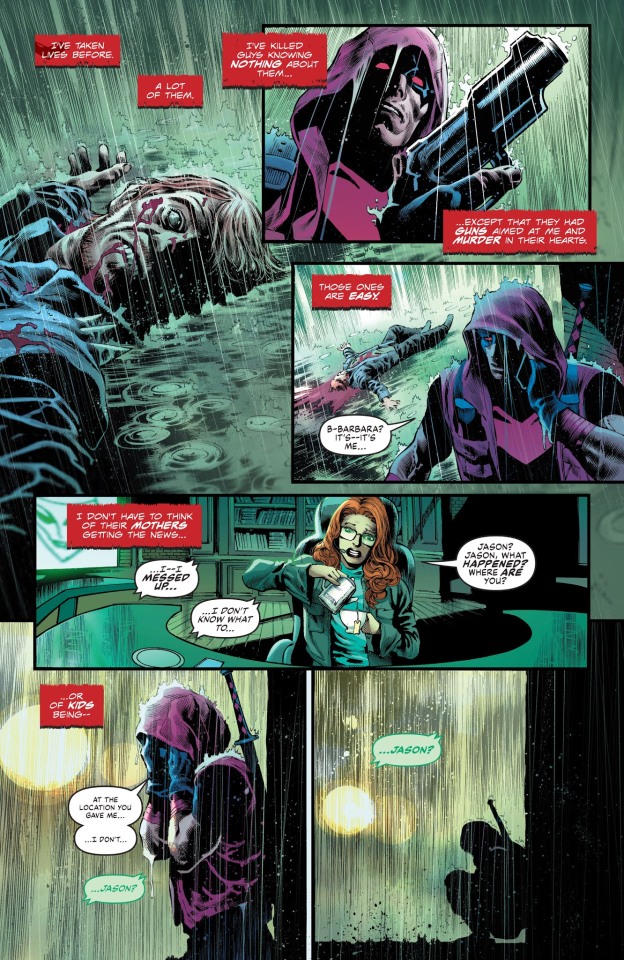
(Oh here's a little aside because it had to be said, Jason would not have been a good father or a good mentor to Tyler and absolutely should not have been his new Robin. Jason is a man who is in his early 20's (not saying men in their early 20's can't be good fathers at all) who is a brutal serial killer using the guise of a vigilante anti-hero to let him escape most of the law. the complications of having the man who murdered your father adopt you and make you his sidekick are way too numerous for me to explain in a long-winded already heavy Tumblr essay post. There's a reason why we don't advocate for a story where Joe Chill adopted Bruce Wayne or one where Tony Zucco took in Dick Grayson.)
The next biggest argument is that they feel that Jason is giving up his guns as a means to just be invited back into the Bat-Family. To which I will tell anyone who has that argument to go actually read Urban Legends. Already have and still have that argument? Please re-read it. Don't want to? That's okay, I will paste the images from the comic where Jason specifically says that he doesn't want to give up his weapons for Bruce and his real reasoning down below since the comic isn't exactly readily accessible.
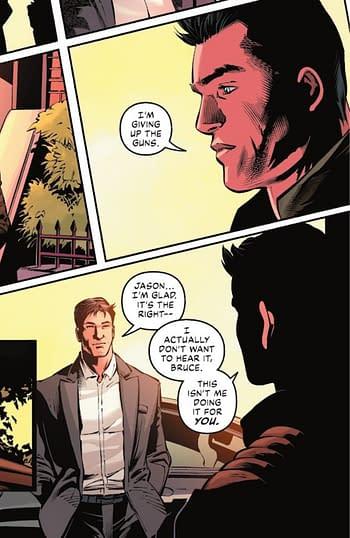
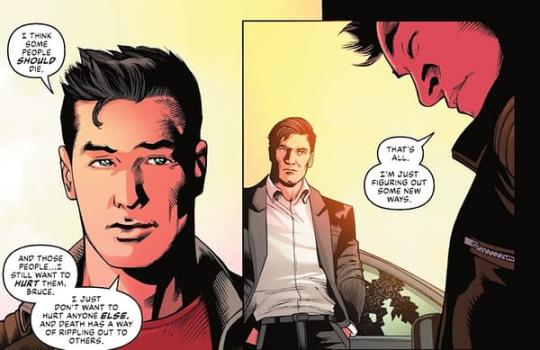
Jason gave up the guns because he felt the gravity of what he had done and knows how it'll effect Tyler. Thankfully his mom is alive and in recovery. But Tyler doesn't have a father anymore. And Jason killed Tyler's father. It may have been in accordance to Jason's philosophy, but it was a case where it blurred the lines. Jason Todd isn't a black and white character, just very dark gray. He doesn't kill aimlessly like the Joker. If you are on Jason's list you probably have done something pretty horrific, and also just in general, being in his way or being a threat to him. Mind you, in early days of Red Hood and the Outlaws (Image below) Jason almost killed 10 innocent civilians in a town in Colorado all because they saw him kill a monster. That being said, Jason isn't aimless in his kills.
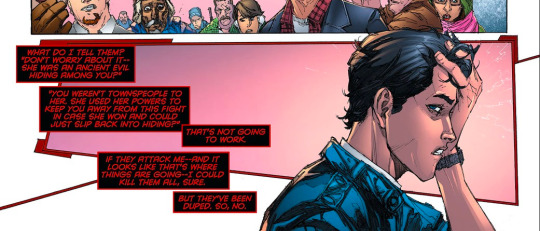
(Also can we just take a moment to appreciate Kenneth Rocafort's art? DC Comics said we need to rehabilitate Jason Todd's image and Kenneth Rocafort said hold my beer: It's so SO GOOD)
That being said, the key emphasis in the story of Cheer asides from trying to introduce Jason Todd back into the Bat Family and give an actual purpose for him being there, other than him just kind of being there ala Bowser every time he shows up for Go Kart racing, Tennis, Golf, Soccer, and the Olympic games when Mario invites him, is that Jason and Bruce ultimately both want the same thing. Jason wants to be welcomed back into the family and to be loved and appreciated. Bruce want's Jason back as his son and wants to love and protect Jason. Both of these visions are shown in the last chapter of Cheer while under the effect of the Cheer Gas. It's ultimately this love and appreciation they both have for each other that helps them overcome their challenge and win.
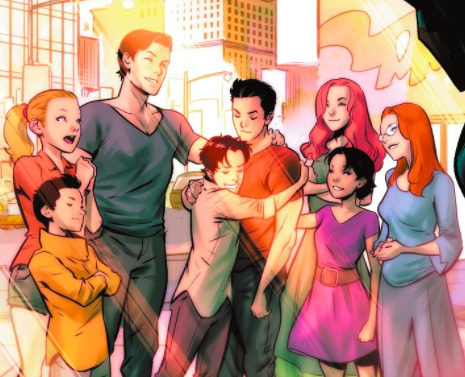

Jason Todd is a character who, just like Bruce, has been through so much pain and so much hate in his life. The two are meant to parallel each other. While Bruce chose to see the best in everyone, giving every rogue in his gallery the option to be helped and give them a second chance, hence why he never kills, Jason has a similar view on wanting to protect the public, but he understands that some crimes are so heinous they cannot be forgiven, or that some habitual criminals are due to stay habitual criminals, and need to be put down. But at the end of the day, the two of them both try to protect people in their own ways.
I am aware that through the writings of various DC Comics authors such as Scott Lobdell and Judd Winick, the two have had a very tumultuous relationship. And rightfully so, I am by no means saying that Scott Lobdell writing an arc where Bruce literally beats Jason to within an inch of his life in Red Hood and the Outlaws, nor Judd Winick's interpretation of Under the Red Hood where Bruce throws the Batarang at Jason's neck, slicing his throat and leaving him ambiguously for dead at the end of the comic is appropriate considering DC Comics seems to be trying everything they can to integrate Jason back into the family. That being said, a lot of these writings have shaped the narrative of Jason and Bruce's relationship and have an integral effect on the way the fandom views the two. It doesn't help that Zdarsky acknowledged Lobdell's life-beating of Jason by Bruce at the very end of Cheer by having Bruce give Jason his old outfit back as a means of mending the fence between the two of them. That does complicate a lot of things in terms of how they are viewed by the fandom and helps to cause an even greater divide between the two.
Regardless, I want to emphasize the fact that Jason Todd is a part of the family of his own accord. Yes, he's quite snarky and deadpan in almost every encounter. However, Jason is absolutely a part of the family and has been for a while of his own will. There's a great moment in Detective Comics that emphasizes this. Jason cares about his family because it is his found family. Yes, they may be warry about him and use him as a punching back and/or heckle him. At the end of the day, we're debating the family dynamics of a fictional playboy billionaire vigilante whose kleptomania took the form of adopting troubled children and turning them into vigilante heroes. Jason Todd wants a family that will love and support him. This is a key definition of his character at its most basic. This was proven during the events of Cheer and is being reenforced by DC Comics every time they get the opportunity to do so.

Now, none of this is to say that I hate Judd Winick. I do not, I don't like the fact that in all of his writings of Jason, he just writes him as a dangerous psychopath, and Winick himself admits to seeing Jason as nothing much more than a psychopath. Yet Winick is the one who the majority of the fandom clings to as the one true good writer of Jason Todd because 'Jason was competent, dangerous, smart' Listen, friends, Jason is all of that and I will never deny it. However, what I love about Jason isn't that he's dangerously smart of that writers either write him as angsty angry Tumblr sexyman bait or that they write him as an infantile man child with a gun. There's a large contention of this fandom that has an obsession with Jason Todd being this vigilante gunman who is hot and sexy and while I definitely get the appeal. It is very creepy and downright disturbing that all of you hyperfixate on his use of guns and ability to be a murderer. It is creepy and I'm not necessarily here for it.
What I love about Jason Todd is that despite all of the pain, all of the heartache, all of the betrayal, and bullying, and death, and anguish. Jason Todd is one of the most loving and supportive characters in all of DC Comics. Jason has been through so much in his life, but he still chooses to love. He still chooses to see the bright side in people. Yes, he takes a utilitarian approach and chooses to kill certain villains, but at the end of the day he wants to see a better world, and he wants to be loved. It takes so much courage and so much heart to learn to love again after one has been abused or traumatized. I would not blame Jason at all if he said fuck it and just went full solo and vigilante evil. He has every right to, but he still chooses to be with the Bat Family of his own accord. That's something that I see a lot of in myself. I have been through a lot of trauma and yet I try to be a better person myself in any way that I can. It is extremely admirable of Jason to allow love back into his heart when he really doesn't need to. He kills and he protects because he has this love of society. It may have been shaped by anger and hatred, but Jason has found his place amongst people who love him and value him. I think Ducra, from Red Hood and the Outlaws put it best in the image given below.

To end this tangent, I love Jason Todd and all of his sexy dangerousness, but it's far more than that. As much as Jason may be dangerous and snarky, he loves his family without a shadow of a doubt. I look up to Jason Todd because despite all of his pain and all of his trauma, he still choses to love. Jason Todd is a character who is someone I love because despite all of his flaws and having a very toxic fandom, he still serves as a character filled with so much heart and so much passion. I wish more writers would understand that. But for now I will live with what I have. Even though the fandom may be vocal about it's hatred for his characterization, I choose to love Jason regardless because he is a character who chooses love and acceptance regardless of his pain. Jason Todd is by no means a good person in any sense of the word. He has easily killed upwards of 100 people by now. He is a character who is flawed and complex but ultimately is one who powers forwards and finds love and heart in a place from so much pain and anguish. That is what I love about Jason Todd. After all, to quote a famous undead robot superhero, "What is grief, if not love persevering?" Jason Todd chooses to love despite all of the trauma and pain and grief. Yes, he is hardened in his exterior, but inside there is a man with a lot of love to give and someone who deserves the world in my eyes.
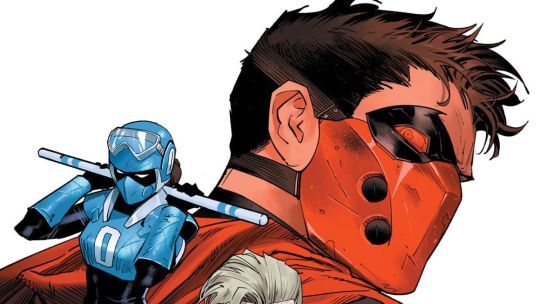
#Long post GOD#Jason Todd#Red Hood#Bat Family#Batman#red hood and the outlaws#RHATO#RH:O#Batman Urban Legends#Red Hood Lost Days#TW Voltron#TW Death#tw murder#TW Klance#Gotta love how i am pouring my heart out onto jason AND calling out the Voltron fandom#Regardless love Jason Todd people
150 notes
·
View notes
Text
Can I go all social worker for a second here? Can I write an essay? Okay maybe not an essay, my next semester starts tomorrow and I’m already tired. But a discussion board post? On the ACE study (which you need to look up if you don’t know about it, it’s so interesting), strengths perspective, attachment theory and family development? Yeah? I’m so sorry, I know for a fact that this interests literally no one but me. But here it is, my self indulgent discussion board post on the power of positive relationship examples and early attachment/unconditional positive regard.
The fact that Franny, Liam and Fred get to watch Ian and Mickey learn how to be married and grow together as a couple is both incredibly sweet and it will play a major role in their emotional development. It’s beneficial to the whole family- none of the Gallaghers really know what a mature long term relationship looks like.
But those kids, especially the younger ones, get to grow and develop in a completely different context than the rest of their family. Sure, money’s still tight and they live in the same house. Yes, they’ve all experienced some significant Adverse Childhood Experiences. Exposure to drug/alcohol abuse, household members in the criminal justice system, parental death, divorce/separation. You name it, all the Gallaghers have experienced it.
But do you know why Liam’s already creating a completely new path for himself? And why I’m certain that Franny and Fred have the ability to do the same? Early secure attachment. They actually had a parental figure that they could rely on for basic needs and comfort.
While the older kids had Fiona, there’s really only so much a child can do, and I highly doubt any of them had any secure attachment in infancy/early childhood. That’s a risk factor in and of itself. That’s reason to believe that none of them fully emotionally developed in childhood. They were in survival mode, relying on Fiona when she could be there, and consistently being let down by Frank and Monica.
While Liam, Franny and Fred all had varying levels of exposure to Frank, none of them ever had to rely on them. By the time Liam was born, the older kids were able to work together to take care of him. For the most part, if Liam had a need, it was met. It wasn’t perfect, but it was met. He learned that people will keep you safe and that the world is generally friendly. He never had to actually rely on Frank for much of anything, he was more like a deadbeat, weird uncle who sometimes showed up to take him on wacky adventures. Then he’d come home, Fiona would have made dinner, Lip would help him with homework, and he’d be loved and protected by his siblings. It’s similar for Franny and Fred- I’d even go as far as to bet that they developed relatively secure attachments with Debbie and Lip/Tami respectively. Debbie and Lip learned how to care for others by modeling after Fiona and because they had been cared for by Fiona in their own childhood.
So developmentally, the three of them have already experienced some protective factors. But the whole family really lacks exposure to healthy adult relationships. We see it time and time again throughout the show. Fiona, Lip and Debbie all struggle tremendously with relationships. Lip and Tami are trying, but there’s a long way to go with them. Say what you like about season 11, but I think it was a realistic portrayal of Ian and Mickey learning what marriage means to them. How would they know? They have no prior experience, no positive examples. Not only are they learning what marriage means to them, but they’re learning what marriage looks like in general. And they’re growing! Together! Learning about compromises and communication and how to be on the same side. It’s huge! I could write a whole essay just on this, on their growth as individuals and together.
But I can’t emphasize the importance of the kids observing this. Not only do they have improved emotional development but they get to model future relationships after Mickey and Ian’s. Even though they’re learning themselves, they get to see long term love and see two people truly have each other’s backs. They’re partners, they have been for years. The kids get to watch them resolve conflict without the threat of separation- they’re on the same team.
And not only does this increase the kids’ likelihood of developing these strong relationships in the future, but it also speaks to the healing power of relationships, romantic or platonic. Mickey and Ian both have experienced tremendous amounts of trauma, and I will argue with anyone who says that their relationship hasn’t been mutually healing.
And I know these are fictional characters but I really do think that Shameless’ portrayal of generational trauma and abuse is incredible. There’s so much emphasis on strengths perspective and resilience and I love that it all fits. It makes sense- for both family and individual development.
I’m so sorry that’s been my Ted talk.
#its ok if you don't want to read this#I get it#ian gallagher#mickey milkovich#liam gallagher#franny gallagher#fred gallagher#gallavich#shameless#shameless headcanons#shameless headcanon#shameless hc#shameless fanfiction#shameless fanfic#shameless fic#my writing#my fic
161 notes
·
View notes
Text
Plotting vs. Pantsing
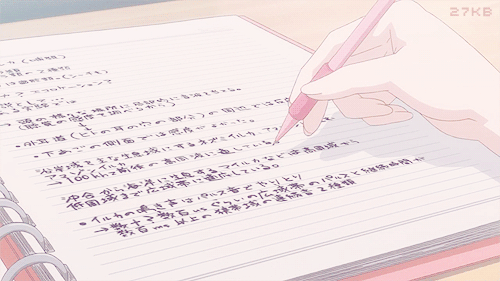
Hey everyone! It’s Abby with another writing post - today we’re talking about the different between plotting and pantsing! Let’s hop right in.
What is plotting?
Do you remember in middle and high school when your teachers placed a huge emphasis on writing out an outline for your essay before writing it? You had to have plans for the introduction, three body paragraphs, and a conclusion, and what you would include in each. This is plotting.
When you plot, you essentially determine what happens in your story before you actually write it. People do this is all sorts of ways and in lots of different levels of depth. Some folks have a guide of a page or two, some have mini-novels for their real ones. Personally, I tend to fall within the 5-8 page range for the stories I plot.
Plotting can include decisions on things like:
Opening and closing scenes.
Major plot points.
Any scenes you want to include.
The act structure.
An order of scenes, chapters, and events.
Any details, exposition, or dialogue.
Like I mentioned, plotting can go really in-depth if you choose to take it in that direction. Plotting is the kind of tool that you can use to any extent that you’re comfortable with.
What is pantsing?
Coined from the popular phrase, “Flying by the seat of your pants,” this is exactly what it sounds like. Pantsing is the opposite of plotting in that there is no planning done before the writing.
There’s not too much more to say in this one. Writers may jot down a few ideas for things they want to include in the next couple of sessions or as a later plot point, but how they get to that spot remains to be seen.
What are the strengths and weaknesses of both?
There’s a long, long debate about whether plotting or pantsing is “better.” In truth, neither of them is really better than the other, and they both have their pros and cons. Let’s take a look at both!
Pros of Plotting
Strong choice for writers who enjoy structure.
You have the details determined before you get to them.
As you write, you just have to follow your outline instead of deciding what comes next.
Outlines can be edited to account for plot and structure errors and editing later on.
Cons of Plotting
Some writers may feel stifled when they have to follow a pre-determined story.
Doesn’t really allow for any changes or ideas the writer thinks of later without changing the whole structure.
The plotting process can take time that otherwise would have been used for writing the first draft.
Pros of Pantsing
Allows writers to work with ideas that come naturally as they write.
Some writers thrive in a more spontaneous writing environment.
Writers can decide how the past of the story affects the present in possibly surprising ways.
Cons of Pantsing
There are often plot holes and structure issues that need to be edited out later.
Writer’s block may be more common if the writer can’t think of what happens next on the fly.
Keeping consistency with plot, characters, and world-building may be more difficult.
Evidently, they both have their own strengths and weaknesses, and they appeal to different types of writers. As mentioned before, neither one is better than the other, but both will require their own adjustments and processes. If you’re a pantser, get ready to edit. If you’re a plotter, get ready to plan.
How do I know which one works for me?
Experiment! Try writing stories both with and without planning done beforehand, and see which one you enjoyed more - both in the process and in the actual content. After a while and a bit of trial and error, you’ll figure out which one works best for you.
This might take a while, and that’s 100% normal. For me personally, it took about five years and eight drafts to discover that I work best with a somewhat loose outline when I write. Now that I’ve figured out the process that works best for me, I find the writing process to be much smoother and more enjoyable. It’s all about experimentation and finding what works best for you!
If my work helps you or your writing, please consider supporting me by joining my Patreon!
Join my writing community on Discord!
#writeblr#writing tips#writing advice#plotting#pantsing#plotting vs pantsing#authorblr advice#author advice
114 notes
·
View notes
Text
Adventure and 02′s production philosophy and its impact on the storywriting (or: “a series made with love is best understood with love”)
It’s hard to really judge a series too much by its production details, but Adventure and 02′s staff has been very open about discussing background and production to the point we’re able to involve it in discussions. In fact, to a certain degree, we’ve gotten rather reliant on said production notes to explain too many things that weren’t clearly depicted or stated in the series -- I’ve spent a fair share of time complaining about how frustratingly subtle this series is -- and you see a lot of strange conspiracy theories or myths about production that circulate in all sorts of different directions. Undeniably, it’s a series that spoke to a ton of people, but there are still so many things that have perplexed people over the last two decades, and when you ask someone “what’s good about this series?”, people struggle to say it in clear words, often only able to resort to a rather oversimplified explanation like “the character development is good” (but what is character development, anyway?). A lot of times, some small things that initially don’t seem to track have led to some pretty wild, far-reaching fanbase-endorsed theories, when in fact the actual reality of the situation is much more mundane.
I think, in general, the best way to “understand” Adventure and 02 is simply to have an open mind about everything in regards to it. This is something I can only say because we currently have more than enough evidence, given production testimony, that this is the kind of series that was made with that kind of philosophy -- I will not shy away from the fact that there are things in this world that are made maliciously, meant to “one-up” the audience or using half-baked explanations as a way to cover up the fact that it wasn’t well thought-through. But in the case of Adventure and 02 specifically, almost everything we have heard about it is to the contrary, and, in practice, I find one can get much more out of the series by adjusting one’s mindset to think about what they’re looking out for and not, because once you have, the beauty of the series opens itself up even in places you’re not looking for it.
Let’s talk a little about the production philosophy behind Adventure and 02 and how it shaped a series that left such an impact on so many kids, and what we can learn from it!
“Something important that we wanted to tell the kids who were watching”
The two most important figures to know when it comes to Adventure and 02 production are its producer, Seki Hiromi (who would eventually go on to produce Tamers and Frontier as well, along with being supervising consultant on Kizuna), and its director, Kakudou Hiroyuki. I would say that both of these figures are probably the most influential people in shaping the series as we know it, but in different ways -- Kakudou was the one most responsible for building the world of Adventure and 02 and setting up the standard for having all sorts of background worldbuilding details that weren’t shown in the series, whereas Seki was the one who pushed for them to include family backgrounds and things that ought to be relatable to the average kid, so that they could empathize with the problems shown on screen.
Both of them had different ways of going at it, which is all for the better because it allowed the story to be enriched from both sides, but the common thread between the two was that they wanted to use this opportunity to “show the kids important things”:
Kakudou is the kind of person I would say is very “media literate” -- he was very well-read in books and well-versed in cinema, not just Japanese but also internationally, and also very in-tune with the Internet by the standards of a director in 1999. (Part of the reason we know so much about Digimon production now is that he still keeps up with everything on social media and throws in a few comments here and there.) His comments on the final episode of Adventure include a list of all of the things he credited for inspiring him during this series, and he later stated that he had a goal of conveying all of those “interesting things” to the kids watching, so that they could also find it interesting. So in other words, Adventure and 02 were basically his love letter to everything in media that he’d come to appreciate.
Seki was the one who pushed for humans to be involved in the series so that the audience could empathize with them, and for all of the “real world worldbuilding” like the kids’ family backgrounds. She’s also functionally responsible for the base premise of 02 at all, having been thoroughly alarmed by the story of a young boy skipping grades into university (to the point this plotline resurfaced a whole 20 years later in Kizuna). It can be said that the heavy “human drama” elements and family background emphasis continuing into Tamers and Frontier are probably her doing, and in terms of Kizuna, she also was responsible for personally vetting the dialogue to keep the kids in character, and it was said that it came off like she loved the characters as if they were her own children.
The result is that, firstly, Adventure and 02 is a series that is very well-thought through. Ridiculously well thought-through, in both background lore and character backgrounds and mentality. So many surface-level criticisms of Adventure and 02 come with an accusation that the writers were “lazy” or “did a writing cop-out”, but we actually have more evidence that the Adventure and 02 staff thought out so many details in the background that they kept forgetting that they hadn’t actually told the audience about it yet. (No, seriously, there’s a thread of official staff repeatedly forgetting that they may not have actually outright mentioned one of the background details they’d planned out in advance.) Even despite all of the extra information we’ve gotten since in the drama CDs and Animation Chronicle and such, it seems there’s still way more information that was planned out that we still haven’t learned about, and it’s presumably why there are so many little things that are too consistent to be coincidental and yet were still never actually stated. It may have been awful at communicating those details well, but those details were most definitely there, and both series have a shocking amount of consistency in adhering to them.
The second is that not only did the producer and director want to convey those important things, they also encouraged the rest of the staff to do it too:
One of the concepts behind the prior series was for us to pack in as many interesting things that we’d seen, heard about, or read about as we could into it, so for 02, we thought, what else could we put in beyond even that?, and so we looked over what we needed to have, and put in all the things we could so that they wouldn’t be left out, and the story became a multi-layered one, overlapping and accelerating. It was to the point that, after we’d gone through 02‘s story, the scriptwriters told me that they’d worn everything they had out to the ground.
So in other words, Adventure and 02 were basically a sort of potluck where they encouraged everyone on staff to come up with interesting things that they wanted to show the kids, and throw it all in -- and it’s presumably why the second half of 02 is so “crowded” (more on this later), because you had everything from all of the writers on staff adding another thing into the potluck, until everyone could get it out of their system. Yoshimura Genki, one of 02′s head writers, said outright that she used the famous 02 episode 23 to convey her concerns about some very real and horrible things happening to kids at the time, and it’s easy to imagine that all of the other writers and staff members were given similar encouragement to do so. Even the (in)famous 02 episode 13 was something originally created from Kakudou seeing Dagomon, thinking he was really cool and wanting to make an episode about him, and remembering that Konaka was good at Lovecraft and basically going “he’s gonna love this, we should get him to do an episode.” In fact, it’s said many times that a huge attitude behind production was to “not be ashamed of anything” and try whatever they wanted.
Which means that the result is a series that isn’t actually all that well-organized in plot or structure -- 02′s plot writing is of course an infamous pile of knots, but even those who are willing to be a bit more critical of Adventure often point out that its plot is simply more linear, being basically a video game-esque boss rush of “evil enemy, followed by even more evil enemy”. Most people do not watch Adventure or 02 for the actual plot writing. What they do watch it for is all of this stuff mentioned above -- that all of these different people on staff were given the question “what do you want to say to this audience of kids?” and took the opportunity to say something fun or meaningful. And, hence, why it’s best to understand Adventure and 02 not necessarily by the minutiae of its plot, but rather, “what was this series trying to say?”
Writing the series as it went along, under massive constraints
In general, Japanese anime is produced as it goes along -- even the character writing is subject to change depending on the voice actors’ performance (this was cited for Adventure specifically, but it’s well-known common practice for non-adaptation anime in general). That said, Adventure didn’t even have a guarantee of how long it was going to be at first -- it was generally expected that it’d be a one-year series (like most Toei series), but they weren’t even sure about it. This resulted in a very “loose mindset”, in which they decided to basically wing it, and the only thing determined for sure was that the epilogue (that we now know as the 02 epilogue) was going to be at the end of it.
As I mentioned above, scrutinizing the plot of Adventure too closely reveals that it’s not actually that coherent of a narrative, just more linear -- and, even by official admission, Hikari wasn’t planned to be the eighth child at first nor was the Tokyo arc of episodes planned to be that long, and yet this entire section is one of the most famous parts of Adventure. A lot of the best parts of Adventure and 02 seem to be the result of sheer accident...
...Or was it accident? Can you say that “going in with a positive mindset and a desire to do something meaningful” is accident? Even if you didn’t plan things out from the beginning, if you go into everything with an attitude of wanting to make the best out of something and make the best out of opportunities you see and hear about, is that really an accident? Couldn’t you perhaps say that this kind of thing is why Adventure and 02 hit so well with people to begin with?
By the time we get to 02, 02 started off as a very different series from the get-go, and it’s always struck me as very odd that people act like 02 was tacked on and didn’t have nearly the exact same staff. It was Kakudou himself who petitioned for 02 to start off with a light atmosphere, and the series itself was fundamentally meant to be addressing the new concepts of “relationships” instead of Adventure’s “self-assertion”, and explore concepts that hadn’t been covered in Adventure. The reason 02 is so different from Adventure is exactly because the staff didn’t want to rehash things for another year, and instead wanted to take the opportunity to cover stuff Adventure didn’t. And the fact that 02 is lighter than Adventure at first, but quickly gets darker, is also by design:
The story had gotten rather heavy by the time of Digimon Adventure, so we decided to make it come off as brighter. And then, it actually ended up getting even heavier somewhere down the line, but there was no way we could just avoid depicting important life problems.
Which is also a similar sentiment reflected by Seki herself, when thinking about how her suggested plotline ended up making the story darker:
An overly intelligent child, prone to falling into loneliness, cut off from his friends and family, and with a Digimon slowly coming and staying close to him…I remember that kind of image forming. We were supposed to have been aiming to have them going to the Digital World with the mood of a picnic, but the fact it didn’t end up so easy for them may have been my fault…or so I remember thinking as I reflected on it.
02 didn’t get dark for the sheer sake of getting dark, and in fact it’s not like the staff necessarily wanted it to get that way, but there were so many meaningful things that they wanted to tell the audience of kids that they allowed it to. It’s also kind of odd how the fanbase has this idea of there somehow being staff conflicts or people bickering in order to produce 02, but there’s no indication of this at all -- at most, 02 unusually had two head writers instead of one, Yoshimura Genki and Maekawa Atsushi, but it was even said that they had a clear division of roles, with Yoshimura on the “villains” side and Maekawa on the “protagonists” side, and there’s no sign of conflict.
(A lot of people also tend to give more credit to Yoshimura since the villains are some of the most masterfully crafted part of both Adventure or 02, but this is still somewhat reductive; Maekawa is very open about the fact that he was rather inexperienced during 02′s production, and considering the fact that the 02 protagonists aren’t nearly as underdeveloped as the fanbase claims they are, and Maekawa would later go on to write a PreCure entry that basically saved the franchise and a very well-acclaimed Super Sentai entry, both with many parallels to 02, his role should not be discounted, especially since 02 is often liked by its fanbase for the duality between both its lighter and darker sides.)
So we had the staff basically on a roll of throwing in everything important they wanted to say to the kids, both “fun” and “meaningful”, and then, two things impacted the way it ended: firstly, they weren’t allowed to go with their initial proposal for the final enemy because it was too gory, and secondly, the decision was made midway through that they would not be making a third Adventure series, and would have to end more quickly than expected.
I think, whenever you hear stories of “we were originally going to do this but couldn’t,” people generally tend to assume that they should have done the original plan (especially if the original plan was particularly gory or brutal, because everyone loves to think that edgy is better), but, perhaps fittingly for a series that’s about not drowning in past regrets of “what should have been” and learning to move on, the staff has never really shown any indications of really, thoroughly regretting any of the decisions they made for 02, even if the second half came out messy. If you look at that original proposal they had for 02′s final enemy, in which it would be an enemy “reduced to an idea”, it certainly explains a lot about why BelialVamdemon was defeated by the power of sheer positivity in the final ending -- obviously that would make a lot more sense with a conceptual embodiment of malice, instead of a returning enemy from the prior series -- but at the same time, that loss of that concept led to the creation of Oikawa, Archnemon, and Mummymon, which have consistently been praised as one of the most compelling parts of 02 and its finale, and Yoshimura herself even gushed about the concepts they got. So it’s not “we couldn’t do what we wanted,” it’s more “we couldn’t do what we initially wanted and made something out of it, arguably an even better something in certain ways.”
And as for the lack of the third Adventure series, all indications point to the fact that this was something by personal choice of the staff, not by higher-up mandate -- not that I enjoy speculating about other people I don’t know, but if you actually follow what Kakudou has said about his work on Adventure and 02, and the fact that he considers his later work on X-Evolution to functionally be getting everything else out of his system (even saying that he liked Bandai doing a lot of the work for him), Kakudou doesn’t seem to want to be the main leader of his projects for the most part, mostly seeing Adventure and 02 as the one time he got to dump all of his one-time ideas that he personally wanted to accomplish, and otherwise being satisfied doing episode direction work for others -- testimony as to the handoff between 02 and Tamers consistently depicts him as expressing sentiments similar to “please let me have a break.” (As of this writing, he still does work for Toei, but has never been lead director on a full series since.) Kakudou didn’t like having to deal with a bunch of increasingly canon-contradictory works because, as an infamously detail-oriented and consistent person, dealing with that kind of thing didn’t really seem to agree with him, and moreover it’s understandable that he (and the other staff) would feel that it was better to end it there instead of overstaying its welcome and stretching things out.
Certainly, when you look at the second half of 02, its plot is “crowded” in nearly every direction (not as incomprehensible as people like to claim it is, but definitely going in a lot of places at once). The infamous 02 epilogue is probably the biggest example of the disparity between staff thought and how it came off; remember that it was one of the first things decided about the series at all, meaning that the staff was deliberating over it and under the impression they were building up to it for a whole two years, but when it finally dropped everyone was blindsided and even often made accusations of the staff coming up with it at the last minute while drunk or something (not helped by the staff clearly being so fixated on their own production that they even included details that were completely incomprehensible to anyone not aware of the potential third series plotline). Yet, ever since then, many people who have sat down with it have figured out that it’s not that incomprehensible and that many of the aspects of it make sense on a theoretical level or are foreshadowed in the series -- it’s just that they tacked it onto the end of an excessively crowded finale with no warning and didn’t sufficiently communicate their reasoning for it, requiring people to spend the next 20 years puzzling it out and Kizuna to come around to drop even more clues, and also failed to realize that one of humanity’s most die-on-a-hill issues about media (shipping) would make people a lot more offended than they likely intended. (PreCure has successfully pulled off “adult timeskip” epilogues in recent years, and they’ve all been received well, but the difference is that they actually pad out the episode with a proper lead-up instead of just chucking it in your face right after Oikawa dies.)
And, ultimately, the staff has never shown any signs of having regret over this. Kakudou takes the stance that they were able to close out 02 in a good way, despite all of the circumstances. The rest of the staff, including Seki herself, and overall Toei as a whole, has doubled down further on the latter half of 02′s plot events and the epilogue’s place in canon despite the infamous controversy around it, and I have to say that I do at least understand why they’re like this when you consider the circumstances and their likely feelings on it -- regardless of everything, they’re proud of the work they did on it, and even if not everything went according to original plan, they loved taking the opportunity to use the sandbox to express things they may not have been able to in their other projects, and the epilogue was their baby that they’d been raising for two years. It’s the ultimate question of “satisfying the creators vs. satisfying the audience” -- not to say that I completely agree with the call to be this unaware of how people were going to read this, because it’s not good to blindside your audience or hurt their feelings, but at the same time, it’s said that you will never be able to satisfy an audience at all if you’re not satisfying yourself first. And in the end, despite everything, that something in Adventure and 02, built out of that earnest desire to say something, came across in some ways and touched the hearts of kids all over the world.
So the result was that the Adventure and 02 staff did everything they wanted, got it out of their system, and handed an imperfect but carefully-crafted baton to Seki, who decided that it was a good opportunity to do something completely new, and deliberately picked Tamers’s director Kaizawa on the grounds that he’d had no experience with the series before. Remembering that Seki was on Adventure and 02 and was clearly happy with it, her decision to do something new with Tamers was just that -- to do something new -- and it’s honestly kind of saddening that the series’ respective fanbases treat each other with significantly less respect than their actual creators do, since both series still shared a lot of staff, Kakudou went on to be an episode director for Tamers (and even calls it a “masterpiece”), and Konaka clearly has a lot of respect for his predecessor series as well, with Tamers being its own product made with conscientiousness and a desire to make things meaningful for kids (Kaizawa himself has expressed a lot of strong opinions on this topic). A lot of anti-02 folks have often spread a conspiracy theory that Tamers came out of a “writer revolt” because they hated being “restricted” by 02 and wanted “more freedom” -- but that is completely contrary to the above evidence where 02′s production process arguably gave the writers too much freedom, and Tamers head staff was picked deliberately due to their lack of connection to the prior series so that they could do something conversely new and fresh...
One thing that’s interesting about Kizuna is that its director, Taguchi Tomohisa, has spoken very often about his love for the original series, right down to respecting its ability to cover very serious topics. His recruitment philosophy for the movie also seemed to have “being a fan of the series” as a big plus factor, and he moreover shows a lot of respect for the staff members involved in production, both the people he recruited and the long-timers like Seki. “Being a fan of the series” doesn’t necessarily constitute skill by itself, but there’s a lot of similar sentiments in “let’s make something that shows respect and does something interesting and important” and “let’s make sure the staff gets to do something without regrets” also seem to be pretty huge factors in consideration here, rather similar to the original series...
What this means in terms of understanding the series
I do not think that, just because a creator clearly had good reasoning for putting in what they did, the audience necessarily has to accept that. It may have had good intentions, but "intentions” don’t justify things coming off the way they do, or at least, the 20/20 hindsight can make us all get together and think “if that was your intention, there were probably a million better ways to execute that.” And, as someone writing this blog, there are times I really think “if you could have please just thought a little harder about making those ideas clearer so we wouldn’t have to have these arguments...”
However, I do think there is something illuminating about the idea of “adjusting one’s mindset” in response to the above revelations, and going in with an open mind when trying to get something out of the series for one’s own sake. I mean this truly in the sense of encouraging others to find something interesting and new -- this is not a blog I write expecting people to see things the same way I do, as much as I like encouraging people to look out for things they might have not noticed beforehand.
I started writing for this blog regularly last year (I hadn’t even planned to start regularly doing it) after a rewatch of Adventure and 02 with some friends and some honest discussion about the series after it, and one thing we all agreed to do when we did that rewatch was “we are not going to go in with the intent to criticize it.” That is to say, we decided to throw out all of those sentiments that you have to “admit” everything wrong with any series when even bringing up its name -- which is not to say that we’re glossing over potential criticisms or their validity, just “we’re doing this rewatch to have fun and to enjoy and appreciate things, and that will be our priority going in.” After making that agreement, something really magical happened, and it was that we started catching things without even looking for it, things that had clearly been planned but hidden in the background, or things that were caught by one person in the group watch chat and pointed out to the others, and it turned out that a huge chunk of the “criticisms” we might have originally gone in with actually did have answers, we just hadn’t realized it because we were too brainwashed into the mindset of dismissing things as “well, that part’s just bad writing.”
Of course, we’ve seen bad writing -- it’s not like we were going out of our way to absolve everyone for every mistake -- but that base mindset allowed us to better appreciate things we might have missed earlier that weren’t immediately apparent. I’ve said many times that I don’t think the things I write on here are that huge speculation -- in fact, in writing meta, I often throw out a lot of stuff because I think “yeah that’s too absurd, let’s just stick with the simplest explanation” -- as much as I just thread things that are in the series but are frustratingly subtle, because I’m taking things that seem like throwaway details and going “hm, well, instead of just dropping it the first time like ‘probably bad writing’, let’s maybe look at this one more time and see if there was a reason?” And those reasons present themselves surprisingly easily without even that much effort, and after a while you come to realize: this is a really consistent series!
It’s actually very rare that things outright contradict themselves, because it really does not take long to piece together a rational explanation (because those things are in the series, just buried)! This was a detail-oriented series that had a ridiculous amount of attention paid to it, even if it didn’t communicate that! Whenever I post meta, I often get comments from people who say outright that they’d had the same impressions, they just didn’t know how to put it in words! There’s been multiple cases of people independently coming up with readings of the series that the fanbase historically dismissed as a reach, only for official to come out and confirm they were absolutely correct, and a common thread between all of these is that they were referenced in the series, it’s just that people kept wanting to dismiss them because “there’s no way they’d be that detailed”! A truly contradictory series falls apart when you subject it to higher scrutiny (even when you’re being optimistic about it), but there’s a strange thing about Adventure and 02 in that they actually fit together even more when you look closely -- and, again, things start coming in when you don’t even expect it, just because of your mindset.
I suppose the take-home here with all of this is that a series like this is best understood when you have an open mind and a desire to listen to what it has to say. As I said before: Adventure and 02 (and especially 02) are not series that most people watch for the plot, and, to be honest, it’s clear that plot wasn’t even a priority for all of the staff in the first place as much as it was about conveying important ideas and sentiments. And I’m not going to say whether not prioritizing plot or not is a “good” or “bad” thing -- for some people, that kind of thing is understandably very important, and a series like 02 can be very frustrating to deal with as a result! -- as much as, for those who have a genuine interest in sitting down and understanding these series, I cannot recommend scrutinizing the plot too much simply because it will not get you very far, and, to be honest, whenever I see a lot of analyses of Adventure and 02, I really do often wonder if they actually understand the core of the series and the sentiment and emotion behind it, or whether they’re just doing it on a technical surface level so they can say they did (which is usually partially as a bid to passive-aggressively dunk on later series to prove Adventure is superior). The entire concept of objectivity is a lie in itself, but this is not a series that you can get much out of if you try to evaluate it with that kind of detachment; it’s a series that spoke to you through theme and passion first and foremost, and to receive that message and “enjoy” the series is most effectively done when you detach all of those doubts and approach the series without malice.
(By the way, this is not me claiming I’m inherently a “better” analyst just because I also prefer to use this mentality when approaching it; it’s just that I’m a bit frustrated that this kind of approach is so hard to find, despite Adventure’s popularity, because losing out on the heart causes so much rich potential to get lost. This is also the reason I recommend @analyzingadventure‘s work so much -- I’m so sorry about tagging you for the third time here! -- because they’re as positive about Adventure as I am about 02, and their insight and thought into the series coming from the angle of “appreciating” it with genuine positivity is something I believe is truly valuable in a climate where this is very hard to find.)
And this is what I mean, “to approach it without malice”. I don’t mean that you should go in prepared to never have criticisms of it ever again, nor that you should just absolve everything and assume that everything is fine, but rather that going in with a mindset of “we’re going to look for things to love” instead of “we’re going to ‘look past’ the bad” alone has the magical effect of shifting your entire view of the series, way more than I would say with any other. And, again, that’s only something that can happen when the base product was made with this much sentiment and honesty to begin with, and moreover fighting against the mindset to criticize is tough when we’re dealing with a fanbase that’s acted like being “fair” requires “acknowledging” the faults of everything in the same breath you praise it until the horse is beaten for two decades and everyone’s exhausted. (And then yells at you if you dare criticize anything that’s put on the fanbase’s pedestal.) It’s kind of the question of: should this really be about media criticism and whether it’s “objectively” good or bad, especially since this has been brought up so often for two decades now, or might it be better to think about how to have a more positive experience with something that you may not have had before?
Once you get rid of that mindset of “critical by default”, you start to realize things that the series did knock out of the park, or were exceptional, that got too obscured by the distractions of fixating on its plot -- 02 is a plot mess for sure, but I have never seen any series that is so sincere and earnest about its actual themes and things it wanted to say, and it’s something I love it even more for. And buried under that criticism of everyone not getting “equal attention” from an evolutionary forms perspective is the fact that, from a story perspective, they deliberately went out of their way to make sure everyone gets mostly equal focus, which is something that sticks out especially when you start watching other long-running series that aren’t as good about this, and although it’s not completely perfect by any means, they do a damn good job keeping everyone in the 8- and 6-person groups relevant to the very end, which is pretty impressive! And, in the end, you end up having a much healthier relationship with the series -- again, it’s not glossing over everything to pretend nothing is wrong per se, but rather, you’re able to appreciate it and love it for what it is, instead of constantly feeling like you’re making up for its “mistakes”.
66 notes
·
View notes
Note
YES YES YES I WOULD LOVE TO HEAR UR THEORIES
Hello anon! I am very surprised anyone wants to hear my chutney but here's my Strange Man Hot Take with some hopefully interesting info for curious parties:
To be honest, R* included so much misdirection around the Strange Man's identity (especially in RDR1) that I'm not *totally* convinced they're married to any one idea. RDR2 also complicated things by introducing new religions into Red Dead's world (Voodoo, Old Norse, etc.): he's no longer limited to just Christian / Western interpretations, as in RDR1, and it's possible R* might try to syncretise him with figures from other faiths (they did place Bayall Edge in Bayou Nwa, where most of the Voodoo stuff is).
At the same time, though, I think RDR2 actually narrowed things down somewhat in terms of the direction R* chose to take his character, and what we were shown of that. There's still a level of misdirection in RDR2, but IMO, it almost comes off as half-hearted in comparison to what was basically trolling in RDR1 -- it seems like they were a lot more focused on playing the "bad news" angle the second time round.
Based on what we know, and on the balance of things, I'm not convinced that the Strange Man is necessarily meant to be any one thing or figure, but I do think he's meant to fulfil some type of Satanic role within Red Dead's world, either in main or in part.
I won't compare and dissect other theories or anything, I just thought I'd list off some things that people might find interesting:
Armadillo. The deal between the Strange Man and Herbert Moon seems to be a pretty textbook Faustian bargain: Moon is offered earthly rewards ("happiness or two generations"), and although the price was (tellingly?) never specified, it seems like the recent Blood Money update for RDO all but confirmed that the cost was probably his soul. Although it's left ambiguous what Moon actually chose, the Armadillo curse was possibly an unforeseen (for Moon) consequence of the deal's terms, which would fit with similar tales of the devil or demon in question taking liberties with their end of the bargain.
In the files, there's some great audio of Moon off the shits and straight-up saying "I've made a deal with the devil, and I will never truly die!" It's possible this was cut for its own reasons (too overt?), but as a lot of stuff was apparently cut from Armadillo, I'm guessing it was either cut when Arthur in New Austin got cut, or it was part of something that R* didn't have time to implement in the epilogue. Either way, if it's not actually in the game then it's not technically canon, but it is an indication of what R* was thinking during development.
There's a lot of audio from the Armadillo townsfolk in general about devils and "devil curses," but the only thing I know of that definitely made it into the game is a line from the town crier ("Devil has the town in his hand").
There's audio of the Armadillo bartender saying "I heard the Tillworths made a deal with the devil to keep from gettin' sick! I don't wanna die any more than the next man, but ain't no safety worth a man's soul." Possibly idle gossip, but given Moon, possibly not.
RDO seemed to flirt with the idea of soul-selling a little bit with Old Man Jones' line "Well, this is America, so anything can be bought -- even souls," but then RDO pretty much just came right out and said it with Bluewater John in the Blood Money update. Bluewater John also apparently made a deal, almost definitely with the Strange Man (given the Moon deal and how close Bayall Edge is to all the drama); he was based on blues musician Robert Johnson and the myth that he sold his soul to the devil for mastery of the guitar. It's basically a rehash of the Moon deal, except it's... not subtle in its dialogue about deals, devils and souls.
"I GAVE EVERYTHING FOR ART, AND I LEARNED TOO MUCH AND NOTHING AT ALL" written on the wall at Bayall Edge also sounds like a reference to another one of these deals to me ("everything" being their soul, and "I learned too much and nothing at all" the foolishness of accepting eternal damnation for temporary knowledge). I think Bayall Edge might have originally belonged to a painter who struck a deal with the Strange Man for artistic skill, but then the Strange Man slowly possessed him or something -- which could be why some of the landscapes depict RDR1's I Know You locations, and why the writings on the wall kind of look like they deteriorate in quality. The puddle of blood at the foot of the portrait might also be linked to this somehow (whose is it?).
It's the deal-making for souls that really pushed the "devil" theory over the edge for me, because I can't think of whose wheelhouse that would be in except a devil's, or someone similarly malevolent.
Alternative name. The Strange Man's character model is called cs_mysteriousstranger in RDR2, and he's referred to as "the mysterious stranger" at least once in RDR1's in-game text. This could be a reference to The Mysterious Stranger, written by Mark Twain between 1897-1908, in which the stranger is a supernatural being called Satan. (At the end of the last version written, he tells the protagonist that nothing really exists and their lives are just a dream.)
Bayall Edge. Bayall Edge was possibly based on a Louisiana urban myth called the Devil's Toy Box, which is "described as a shack. From the outside, it is unappealing and average. ...The inside of the shack consists of floor-to-ceiling mirrors, including the walls. No one can last more than five minutes in this room. ...According to the legend, if you stood inside this mirror-room alone for too long, supposedly the devil would show up and steal your soul." The Strange Man does show up in the mirror eventually, and it's kind of curious that the paintings that change depending on your Honour act as metaphorical mirrors. This was also cut, but in the files, Arthur's drawing of the interior of Bayall Edge is unusually sloppy, like his faculties were impaired or something.
"Awful, fascinating and seductive". John writes this about Bayall Edge after the portrait is finished, and I think that's as good a description of something like the / a devil as any, but "seductive" is a big red flag for me, because it's such an odd choice of word and, from a Christian perspective, it's so loaded with connotations of evil and sin and temptation.
I Know You. Some have pointed out that I Know You in RDR1 resembles the Temptation of Christ, as it also takes place in three separate locations in the desert, and John is given moral tests in which he must choose between higher virtue or worldly vice. John is also, in a weird way, a kind of Christ-like figure in that he ultimately sacrifices his life for others. I do think the "temptation" in these encounters is very surreptitious but very much there ("Or rob her yourself" -- excuse me??), but they may also be operating on a Biblical definition of the word, i.e. a test or trial with the free choice of committing sin.
RDR1 dialogue. I don't want to get *too* much into this because I feel like we're all just getting punked in RDR1, but I think the Strange Man's dialogue broadly fits with something like a "devil" interpretation, or at least doesn't contradict it.
I'm thinking particularly of lines like "Damn you!" / "Yes, many have" (which would work metaphorically but also literally, given that the devil was thrown from heaven by God and his angels), and "I hope my boy turns out just like you" (of all the leading theories, I think Satan is the only figure who's popularly conceptualised as having a son, or prophesied to have a son -- God obviously had a son, but that ship kinda sailed).
I think the "accountant" line refers to Honour (which even uses an invisible numerical system), and how John's fate depends on the number of both good and bad acts he's committed throughout his life, and how these weigh against each other. If the Strange Man likes to collect souls, then he would have a vested interest in auditing you and seeing if your accounts are in the black or the red, as it were (and providing you with opportunities to push yourself further into the latter...), because if you're bankrupt, you're his.
Blind Man Cassidy. Interestingly, Cassidy seems to distinguish between "Death" and the Strange Man, implying that he's something else beyond his understanding: in one of Arthur's fortunes, after his TB diagnosis, he says "the man with no nose [Death] is coming for you," but in one of John's fortunes, he says "Two strangers seek thee: one from this world, perhaps one from another. One brings hatred; I'm not so sure what the other brings."
Arthur's cut dialogue. In the files, there's audio of Arthur having the exact same conversation with Herbert Moon as John in the epilogue, asking about the Strange Man picture because he "just seemed familiar". I think it's interesting that, like John, Arthur also would have apparently recognised the Strange Man despite (presumably) never seeing him before. Given how strong a theme morality is in Red Dead -- and how much both John and Arthur struggle with it -- my theory is that they find the Strange Man vaguely familiar because they're both familiar with the evil within themselves, or the potential for evil; and likewise, the Strange Man "knows" John because he embodies evil in some sense, so is aware of John's worst sins (like his involvement at Blackwater), or possibly even all of his sins (which would be, like, a lot).
Honourable mention: There's such a greater emphasis on conspiracies, myths, etc. in RDR2 that I half-wonder if the Strange Man's RDR2 incarnation was partly inspired by Hat Man (~excuse the link~ but often it's hard to find good sources for the kind of weird shit R* includes in their games).
ANYWAY, this got a little long but I hope someone found all this at least passably interesting. Thanks again for letting me ramble about the video game man, anon!
15 notes
·
View notes
Text
Part Three: Claims about JGY
Intro - Pt 1 - Pt 2 - Pt 3 - Pt 4
JGY
1) JGY has the authority to teach NHS the SoC
He does teach him, and there's no suggestion from anyone involved that he didn't.
In MDZS, the SoC is explicitly one of the Lan's exclusive teachings, and NMJ objects to LXC teaching it to JGY on those grounds; LXC's response to this includes the fact that it can't be leaking it since JGY is their sworn brother, a consideration which would not extend to NHS. I'm not saying that LXC would necessarily deny NHS the chance to learn it (if he were in fact capable of playing it; it's noted as very difficult), but there is no way that JGY has the authority to teach it to NHS without LXC's permission. Nor does NHS seem to be making any efforts to hide what he's playing (in front of both NMJ and some of the Nie men JGY was just playing in front of), so it doesn't seem as though JGY was playing on that to get NHS to keep in a secret. I grant you the plan is stupid enough as it is, but if he'd obtained permission from LXC to teach NHS that would elevate it to new heights of idiocy.
In CQL, the guqin conversation is missing a great deal of what we see in MDZS, and that includes the exchange about it being a Lan exclusive teaching. Nevertheless, we're not given any reason to suppose it's not—and all later discussion of it pretty much follows on MDZS, where it is.
2) JGY involves NHS in his killing of NMJ
He teaches him the corrupted SoC. Now, as in part one, I think MDZS canon suggests this would result in NHS actually helping NMJ, but that's clearly not what the movie is going for.
In MDZS, JGY consistently defends NHS from and to NMJ, as you've seen in some of the quotes in the previous sections. Moreover, after NHS burns his hands when NMJ burns NHS' things, he's the one who orders medicine prepared and comforts him, advises him to go back to his room and rest, and tries to keep him from provoking NMJ; and then, after NHS has run off and locked himself in his room, refusing to open it to anyone to allow them to deliver the medicine, and while NMJ is still furious about NHS' defiance, accepts the medicine and plans to take it to NHS' rooms after he's finished with NMJ (ch 49-50). He does not involve NHS in his plan to kill NMJ.
In CQL, again, we see rather fewer of JGY and NHS' interactions during this time period—which doesn't mean that they don't happen, just that we don't see it. Again, when CQL doesn't say something, I tend to assume it matches MDZS unless I have a specific reason to believe otherwise—CQL kind of relies on this, in fact, otherwise you have questions like "wait what the heck was JGY trying to dig up in the temple". Regardless of whether you agree with that argument, JGY does hold NHS back and prevent him from running towards a qi-deviating NMJ. Although I've seen it interpreted as cruel, he likely prevents NHS from getting himself killed or injured (as happens in MDZS, where NMJ wounds NHS (ch 50)). And this is of course not strictly part of the text, but I'll observe that ZZJ has said that he thinks JGY would regret allowing NHS to witness NMJ's qi-deviation. There is, regardless, no evidence in CQL that JGY used NHS in his plan to kill NMJ.
3) JGY can straightforwardly prevent NMJ's violence via the SoC
We see him do this when NMJ is about to punch NHS; he's obviously hurrying a little, but the SoC works clearly and quickly.
In both MDZS and CQL, he shows no sign of an ability to do this. Instead he just has to deal with NMJ attacking him. When he can prevent NMJ's violence towards him, it's literally just that he manages to talk him down; JGY is, in fact, incredibly vulnerable to NMJ's violence.
We see more of NMJ targeting JGY in MDZS (see next point), but in neither MDZS nor CQL does JGY show any sign of being able to stop NMJ's violence by playing a few quick measures.
Granted, this is mostly a replay about the SoC being able to stop NMJ's violence quickly even when used by someone with weak cultivation. But it's a very important point.
4) Someone other than JGY is the main target of NMJ's violence.
This isn't an explicit claim, but while NMJ is violent on more than one occasion, at no point is JGY his target, nor (from what I can tell) is it suggested he usually is. Rather, NHS and the Nie men are made to stand out as NMJ's victims.
In MDZS, JGY is absolutely the main target of NMJ's violence;* although he does burn NHS' things, leading to NHS' hands being burnt when he tries to save them, and later injures various people (including NHS!) when he qi-deviates, he does this latter /because he is hallucinating they are JGY/. He calls JGY out at the stairs and /publically/—in front of various Jin disciples!—and not only humiliates him but also kicks him down the stairs then draws his sabre on him with intent to kill him (all this after trying to hit him very first thing after they go outside). Earlier, of course, we see him try to kill MY after MY has just killed WRH and saved his life, and his final qi-deviation is immediately preceded by him kicking open a door to slaughter JGY on the spot for the crime of being upset to LXC about how NMJ treats him…ostensibly combined with him being polite and friendly to NMJ's face, but the last time JGY was anything but, NMJ tried to kill him, and indeed LXC is advising JGY against "provok[ing]" NMJ "again," presumably by talking back to him as he did at the stairs (ch 50).
In ch 118—before the stairs incident, and I think it must have been before the Chang clan are killed too—XY asks if JGY's bruise is from NMJ. Although in fact it is not (and observe JGY's response: “If he were the one who did it, do you think I could still be standing here and talking to you?”), the possibility of NMJ's violence towards JGY is clearly present. In ch 32, when WWX sees some kids playing, although we're told that LFZ is the most popular character and although the text is replete with indications that at this point in time he is both powerful and well-respected, there is /still/ the general knowledge that NMJ is going to threaten JGY and JGY is going to flee:
“Nie MingJue” raised swung his fist, “So what if you’re the Chief Cultivator. You’re still my youngest brother. You’ll have to run away whenever you see me anyways.”
“Jin GuangYao” did indeed cooperate and maintain his character. Flinching his shoulders, he quickly ran away.
See also WWX's comment in the first Empathy chapter, when he's surprised at watching NMJ and MY get along: 'Wei WuXian had heard too much of those jokes of how “LianFang-Zun fled whenever he heard that ChiFeng-Zun arrived”.'
We're even told that the brotherhood oath they swore was unusually violent!
NMJ's determination to kill JGY lasts even into his own death—that's /why/ JGY dismembers him and sets such strong seals on him, so that NMJ's fierce corpse won't kill him. NMJ's violence towards JGY is a central part of both of their narratives, and shows up all throughout the text.
*Well, NMJ is also very pro-Wen-killing, but on an individual level.
In CQL this is a little more complicated. NMJ seems perhaps generally less violent? Certainly we are shown less of his violence, and in e.g. the confrontation in Sun Palace he is not constantly attempting to get to JGY while LXC blocks his blows and explains things. In episode 36, although we still see the children playing, the exchange is a little modified; we're still told JGY is scared of NMJ, but the NMJ kid doesn't raise a fist or anything like that, and the JGY child doesn't run away. Nevertheless, NMJ is clearly hostile to JGY, and his violence at the stairs is the same: attempting to hit him the moment they arrive outside, kicking him down the stairs, and then drawing his sabre on him to try and kill him. The difference is that in CQL, JGY survives because NMJ qi-deviates, whereas in MDZS he would likely have died had LXC not intervened. The emphasis on NMJ's violence towards JGY is much less present in CQL; nevertheless, JGY is still the primary target of what violence we do see.
5) JGY is easily replaceable, indeed at all replaceable, as a subordinate
FJ does not explicitly say this, but NZH seems to be very well-integrated and to have been there a while, and there's no suggestion he is in any way less than a perfect subordinate, or that JGY was better. As though to emphasize this, we see him dive in front of NMJ to take a blow (as with MY in CQL)—and, of course, he has the good grace to die when NMJ tries to kill him. One of the rather underspecified Nie cultivators also flings himself in front of NMJ, taking a blow to save his life (although, to be entirely fair, willingness to take a blow for NMJ is probably the way in which MY /is/ most easily replaceable).
In MDZS, MY's competence as NMJ's subordinate, and indeed the extraordinary level of his competence, are fundamental to his and NMJ's relationship. Consider these quotes from ch. 49:
After he left, Nie MingJue switched to another deputy. Wei WuXian, however, felt that the new one was always a few beats slower. Meng Yao was an unusually clever talent. He could understand what wasn’t said, and perform to the best with the simplest orders. He was efficient and never slacked. Anyone used to him wouldn’t be able to refrain from comparing him with others.
and
Nie MingJue was never close to people. He rarely opened up to anyone. Though he finally managed to obtain a competent, trustworthy subordinate, whose character and capabilities he approved, he found that the subordinate’s true colors were nothing like what he had thought they were. It was only natural that his reaction was so extreme.
Moreover, it's WWX's conclusion in ch 49 that part of the reason NMJ agrees to swear brotherhood with JGY is JGY's extraordinary talent:
From [WWX's] observations, aside from how Lan XiChen brought it up, having always hoped that the two would reconcile, the most important factor was probably the gratitude of saving his life and writing the letters. To be precise, in his past battles, he had more-or-less depended on the information that Meng Yao sent over through Lan XiChen. He still thought that Jin GuangYao was a talented person whom one would rarely come upon, and intended on leading him back onto the right path. However, Jin GuangYao wasn’t his subordinate anymore. Only after they became sworn brothers would he have the status and the position to urge Jin GuangYao, like how he disciplined his younger brother, Nie HuaiSang.
This is also part of LXC's attempt to reassure JGY that NMJ has not entirely turned against him, in ch 50:
Lan XiChen, “He has always cherished your talent, hoping that you would choose the right path.
JGY's extraordinary competence is very much central to their relationship, and the /fact/ that he has to be so extraordinarily competent to achieve any recognition is central to the themes of the text.
In CQL, again, this is less explicit. However, in episode 10 NHS praises him and WWX and JC are impressed by his talent; the captain, the only other high-up Nie man we get an individual sense of, seems rather less impressive. Moreover, at the stairs, when confronting JGY about XY's imprisonment, NMJ says what did I tell you back in Qinghe (about wanting XY dead), i.e. when JGY was his servant, suggesting he still views JGY in the framework of that relationship and at least possibly suggesting that he still misses JGY in that position.
In the interests of justice I will also bring up the important claims about the characters I noticed that /do/ have significant textual support: first, that NMJ is very good at fighting; second, that NHS and NMJ are each other's most important people. (It technically also gets that NHS hates practicing the sabre, but given the way it contextualizes this I'm not giving them any points for that one.) FJ also claims that lying to someone to keep them from knowing something that would hurt them is an expression of love—although in MDZS this goes rather the other way around, with NMJ keeping things from NHS, considered in isolation it does fit in with similar expressions of love in CQL/MDZS.
Now, I want to be clear, I'm not actually being as thorough as I possibly could. To do that, I would have to watch it multiple times and think things over for at /least/ a month, and even aside from the poor anon who's waiting on the answer to the question "what do they erase about NHS and JGY," I have absolutely no desire to spend that kind of time with the film.
Previous | Next
#fj negativity#more than one tag could contain#anger burned in his heart#we can't change places#long meta
16 notes
·
View notes
Text
RWBY Recaps: “Gravity”
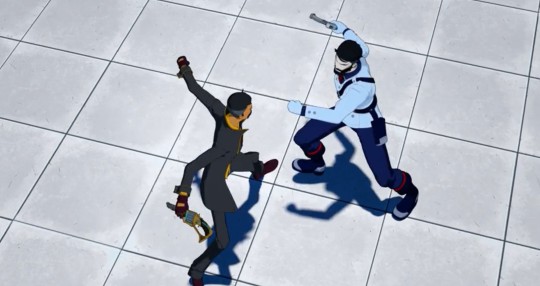
Good lord, folks. Buckle your seat-belts because we’ve got a lot to get through this episode. I think this is my longest recap to date, so settle in.
Episode Eleven’s “Gravity” starts out simple enough, focusing on the two fights we’d set up during “Out in the Open.” First up, Ironwood vs. Watts. Overall this fight does a really excellent job of showcasing their different fighting styles. Right from the start Watts is pointing his gun forward to take a clear shot at Ironwood, whereas Ironwood points his backwards to use as a surge of momentum.
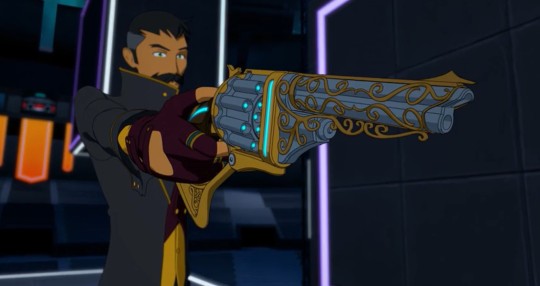
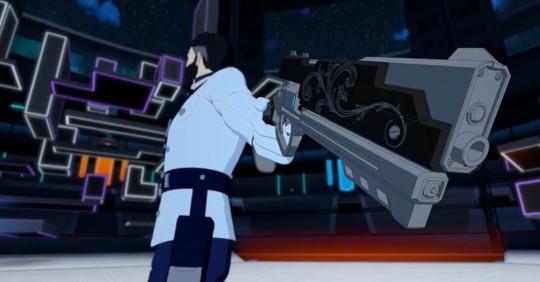
He’s going to do this frequently throughout the battle, constantly using his gun to maneuver in the air, slow falls, regain his balance, and change directions, a much more complicated series of choices than the one-off shots we see Ruby use with her sniper rifle. This is partly because Ironwood seems to have a much larger supply of bullets---some sort of energy/dust ammo---than Watts does. His steampunk-esque gun holds only nineteen bullets, requiring him to keep track throughout the fight. Which is always a fun trope but sorry, Watts, you can’t compare to the king.
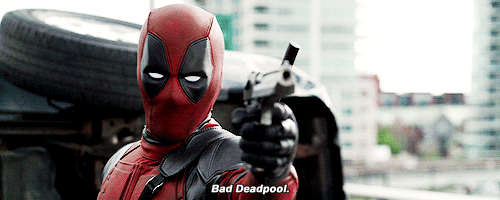
Thus, with limited weaponry available to him, Watts is forced to get creative with the arena itself. We see him manipulating gravity, shooting up columns of water and fire, and making use of his own pathways between platforms, all in an effort to throw Ironwood off and catch up unawares. However, Ironwood is, frankly, the much better fighter. He was right last week to assume he could handle Watts even though he sent three off to tackle Tyrian. He’s able to recover much more quickly and learns from any mistakes, as evidenced by his ability to hit Watts dead on while in the air the second time he takes out the gravity. When they come together in hand-to-hand Ironwood easily dominates, no doubt thanks not just to his military training and huntsmen lifestyle, but also in large part to his prosthetics which I would assume grant him more speed and power. Throughout the course of the fight we see Watts consistently take more damage to his aura and he’s unable to sense when Ironwood is sneaking up on him. After that little maneuver, Watts (presumably) grows reckless and lets off his last three or four shots in a random barrage. All of them miss.
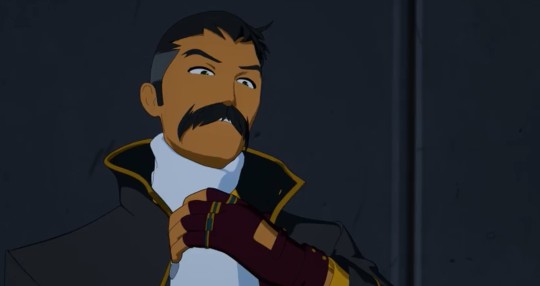
This emphasis on emotion continues when they land back onto the main stage with Watts shouting, “You never appreciated my genius, James! You just stood atop it and called yourself a giant.” Oh, did Ironwood actually do something horrendous in the past? Is there something juicy that would explain---though not excuse---Watts’ turn towards villainy? Nah. He quickly follows that up with, “You chose that fat imbecile over me!” referring to Pietro. So... nice one, Watts. Crazy arrogance, willful ignorance of Pietro’s own, clear genius (anyone who can create Penny is no slouch), as well as a bit of fat-shamming on top of it all. No sympathy from me.
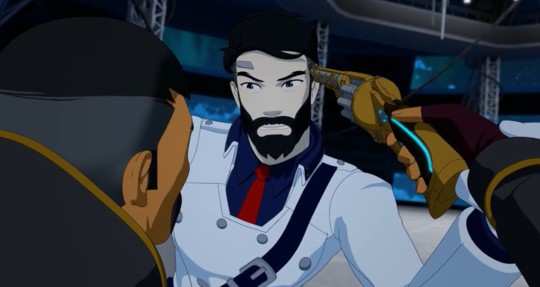
This moment emphasizes how unhinged Watts is becoming though as the fight turns against him. Even when he manages to setup a head shot Ironwood reveals, “You’re smart, but you’re not the only one who can count,” referencing that Watt’s emotions got the better of him, leading to him wasting his last bullet before it could be of real use.
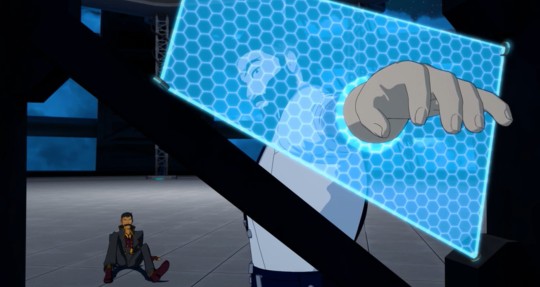
...except not. I’ve got to admit, I was very pleased when all of this---or at least this particular moment---was merely a plan to get Ironwood to let his guard down. Watts is way too smart a character to be done in by the “You got too emotional and that made you sloppy” trope. So kudos there (even if it remains to be seen whether that Pietro comment was really his motivation, or just another part of the plan). Instead, he uses Ironwood’s confidence in his victory to trap him with the rings that control the arena, essentially pinning Ironwood’s non-prosthetic arm through the energy shields he’s been using. We can immediately see that the parts that have touched Ironwood already have horribly burned the skin.
And that ends up being Watt’s downfall. Not stupidity on his own part, but his lack of understanding of Ironwood himself. He assumes that this truly is a trap for him, rather than another sacrifice. After all, what fool would ruin their one remaining arm to stop him? Watts himself wouldn’t. Don’t pull, he cautions Ironwood, not “unless you’re hoping to add more metal to that body of yours.” Watts goes so far as to turn his back on Ironwood who then makes the sacrifice we all knew he would. One burned, useless arm later and he’s free.
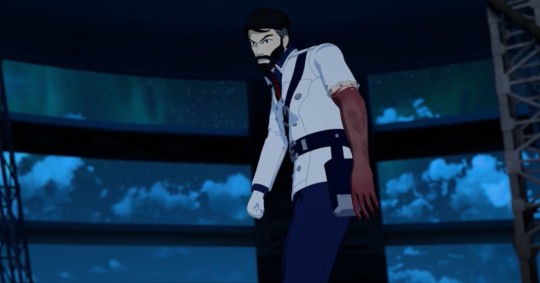
I would like everyone to keep this moment in mind. Namely the utter devastation of it. I’d go so far as to say it’s as bad at Yang losing her arm in Volume 3. Despite seeing it bandaged later, Watts at least thinks it will be a complete loss if Ironwood sacrifices it. He’ll need to “add more metal,” AKA replace his arm, so though he obviously still has it in the following scenes, we don’t know if it will ever be functional again. Just as important, Ironwood had to choose to do that to himself. That wasn’t a horrific, but ultimately clean cut done in a moment of surprise. That was a conscious decision, a slow pull through all that pain, and then having to finish your fight immediately afterward. It’s a very different kind of psychological trauma, no better or worse than having someone take your arm from you by force. Throughout this volume I’ve seen a lot of fans being critical not only of Ironwood’s main decisions, but just his overall attitude as well. Too strict, too stern, doesn’t smile enough, yells sometimes, etc. basically associating someone who isn’t all sunshine and smiles with someone who is “bad.” Ignoring for the moment that we can say the same thing about many of our group---notably Yang---I have little doubt that I’ll see similar posts after this episode. Writings in the vein of, “Ironwood is unhinged! I can’t believe he yelled and hit his desk like that!” So everyone just keep this moment in mind and ask yourself how calm you’d be if you’d sacrificed your arm like that all of half an hour ago. And then found Salem’s calling card on your desk. And then came to the realization that the allies you trusted have been lying to you from the start. And then Salem herself appears to mock you. And then your city is about to be overrun. Basic summary of the rest of the episode: holy shit. So yeah. If Yang is allowed to be angry and upset after losing her arm, or just angry in general like she is in the later half of “Gravity,” I think we owe it to Ironwood to let him be angry too. I have a lot of feelings about the utter insanity he’s been forced through with little to no support and if he wants to take all that out by hitting his desk once, by god I’d say that’s a good coping strategy given the circumstances. Both the writing and the fans tend to erase trauma once you’ve passed age 25. The girls have every right to be upset, to break, to not trust people because they’ve been through a few months of hardship, but Ozpin isn’t allowed the same after a couple thousand years of that. We’re going to see the same hypocrisy later in this episode---the group can be upset about lies but Ironwood is not---and I’m hoping (against hope) that the fandom doesn’t make that worse by sweeping this injury under the rug. It’s horrific and absolutely has a bearing on his inability to keep his cool with the group immediately afterwards. We’ve long passed Ironwood owing them endless reassurances and calm responses.
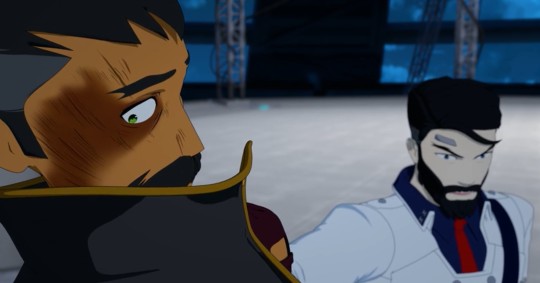
Anyway, Ironwood still manages to finish the fight because his remaining arm is his robotic one, giving him the strength to easily drag and raise Watts into the air one-handed. He dangles him over the edge of the arena, announcing that he will “sacrifice whatever it takes to stop [Salem].” A clear bit of foreshadowing for his decision at the end of the episode. Watts responds that he hopes he does.
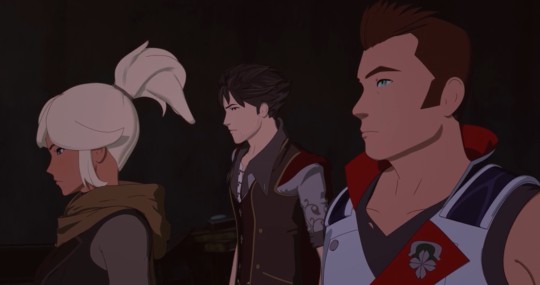
We then move to the Tyrian fight which, on the whole, I don’t think was done quite as well. Granted, there are a lot of enjoyable and badass moments. I like that Clover’s first act is to announce that Tyrian is under arrest, maintaining the law that Atlas (and Ironwood) works to uphold. It doesn’t matter that Tyrian is a crazy serial killer in league with an immortal sorceress hell-bent on destroying the world. Even crazy serial killers have rights and are given the option of surrendering, even when everyone present knows there’s exactly zero chance of that happening. It’s the principal of the thing and the ability to say, “We gave him a chance.” In a world overrun with inequality, this is a small but important attempt to level the field. If you do something wrong you face legal action and those rights are announced to you. Same for Tyrian. Same for Team RWBY. But we’ll get to that.
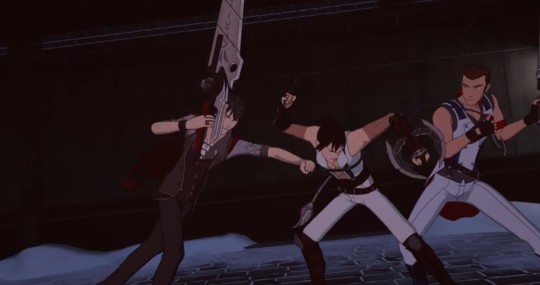
For now, we see Qrow attack first and like back in Volume Four he and Tyrian are pretty evenly matched. The tide doesn’t turn until Robyn and Clover come into play. Throughout this exchange we see a lot of cool combos among the three of them. Tyrian will block an incoming arrow with his tail only for Clover to snag it with his hook. Robyn can get another arrow to perfectly bounce off the walls and then Qrow’s scythe, hitting Tyrian dead on. Clover can dive between Tyrian’s legs, giving Qrow the opening he needs to attack. It is, as said, pretty badass... almost a little too badass. Personally, I would have appreciated them messing up once or twice. They’re all professionals, yes, but Qrow and Clover have only had one fight together. Robyn, meanwhile, wasn’t even allied with them until an hour ago. This is a situation where skills shouldn’t really trump, “We’re three very distinct people who don’t know each other’s fighting styles well, trying to attack one guy in very close quarters.” There should have been some screw-ups. Especially when we take semblances into account. What, are we supposed to assume here that Clover’s semblance just conveniently overrides Qrow’s? That no mistakes---let alone anything bad---will happen in this fight despite the fact that it’s an extreme parallel to Volume Four? That whole battle emphasized, “Don’t come closer!” because when people fight near Qrow bad shit happens. Now, he fights with two other people in a narrow alleyway and there’s not a single repercussion. Based on their travels looking for the geist, I don’t buy that Qrow’s semblance is just conveniently inactive while near Clover. Even if I did... that’s not a very good writing decision. To me, it’s just more evidence that Rooster Teeth doesn’t understand its own rules/doesn’t know what to do with an ability like Qrow’s. It causes problems only when they explicitly want it to. Then, miraculously, it’s no longer in effect.
Still, we’ll acknowledge that RWBY had a lot else it wanted to accomplish in this episode, so the need to power through this fight is somewhat justified. I personally would have had the entirety of this episode be the two battles---I was shocked when both ended just eight minutes in---but I’m obviously not the one writing the show. Thus, instead of an episode devoted to both the action and the emotion of confronting our two main villains this volume, Tyrian loses his cool after getting punched in the gut, manages to catch Robyn’s arrow in his teeth...

But it’s a bomb.

Down he goes. Fight’s done.
Which leads us into the second half of the episode. I want to preface this with a short acknowledgment before we go any further.
Did these last ten minutes give me what I’ve been looking for since the beginning of Volume Six? No. It’s easy to assume it did because all the pieces are there. Ironwood is finally angry about the secret keeping. The Ace Ops are criticizing the group left and right. Surely this is the “The group is capable of making mistakes and they should be called out for it!” that I wanted, right? Not really. For the simple reason that there is a massive difference between:
A story that acknowledges mistakes as mistakes. The characters either grow from this lesson or dig in their heels and are painted as being in the wrong for that decision.
and
A story that takes what the audience (me) perceives as mistakes and frames them as justified choices. The characters do not grow because they’re 100% sure they’re in the right and those who would criticize them are painted as in the wrong.
“Gravity” is so far into that second option I don’t think the series can come back from it. Does the group face criticism? Yes, but every single time the writing insists that it’s undeserved criticism. It paints the group as the underdogs facing unfair odds, rather than equals---with all the responsibility that comes with that---facing criticism that they need to own up to. Absolutely nothing in this second half implies that the group is going to learn from their mistakes because they, and the writing, still insists that they weren’t mistakes. Which is precisely what we’ve gotten before. Cordovin might criticism them, but Cordovin is in the wrong. Winter might criticism them, but Winter is in the wrong. Every time a character goes, “Hey, you shouldn’t have done this” the group responds with, “Yes we should have!” and the story backs them up. Yes, you should have attacked Argus. Yes, you should have stolen an airship. Yes, you should have lied to Ironwood and spilled the secret to Robyn. Yes, yes, yes. That’s the takeaway every single time. The group is never in the wrong. Others just think they are and those others are painted as cruel, militaristic, unhinged characters.
It’s not at all what I was looking for. Just more of the same.
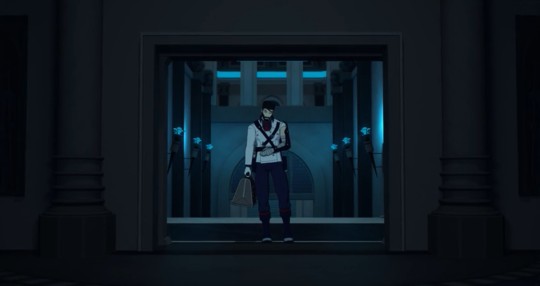
So that’s the preface. In terms of what we actually get, Ironwood returns to his office with his arm bandaged and in a sling, carrying Watts’ bag, only to drop it when he sees the queen piece on his desk. He calls Winter asking, “Was anyone caught entering the school grounds while I was away?” and when she says no Ironwood has her race off to the Winter Maiden, unknowingly leading Cinder there in the process. “Now show me where you’ve been hiding her.”
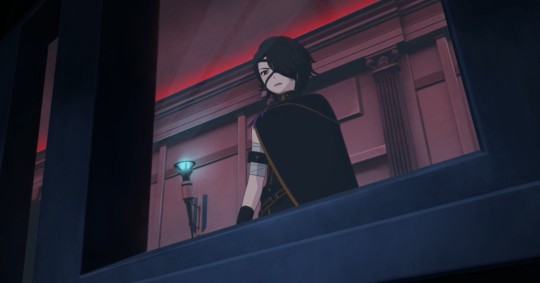
We then cut to the group where the trouble begins. They’re not just curious about why Ironwood is recalling them with Mantle still in need of evacuation, they’re actively questioning it. This is the attitude I simply don’t understand. The group acts as if Ironwood is deliberately screwing everyone over when they know better. This is no longer the beginning of the volume where they thought he was some horrific dictator hell bent on destroying his own Kingdom. This is just an hour or so after, “We should tell Ironwood!” and the happy-go-lucky ‘We trust him now’ moment. Even less time after Ruby stared up at him in awe with, “He’s doing it.” They had reason to trust him before they even made it to Atlas. They were given even more reasons in the form of Ironwood sharing his secrets, early licenses, and being allowed to work on the tower. They then still waited until Ironwood was doing everything they wanted before giving him some of that trust back... but the moment he stops doing precisely what they want---we want to keep evacuating Mantle---he’s deemed suspicious again.
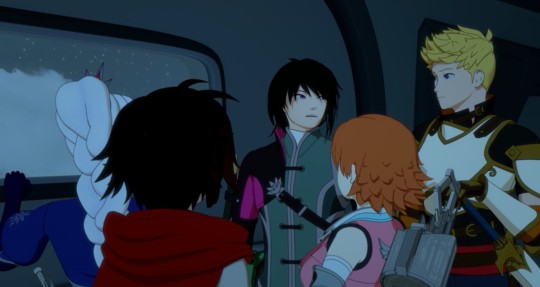
I mean seriously, is the group that dense? Are they incapable of thinking to themselves, “Wow, something must have happened if Ironwood is recalling us before evacuations are complete,” which is precisely the case. The scene tries to frame it as “Group Good” and “Ace Ops Blinding Obeying Orders Bad” but that aspect doesn’t even come into play. There’s nothing blind about it. It simply takes two seconds of critical thinking skills to realize that something really awful must have happened back at the Academy that trumps what you’re doing in Mantle. This is what I mean by the writing being biased. Before we even reach the fight in Ironwood’s office it’s trying to paint him as potentially cruel, potentially suspicious, potentially abandoning his people, look how worried our heroes are about this secret decision he’s made... when all that requires ignoring some really basic deduction in order to reach those assumptions. Remember that intelligence is a plot device in RWBY. If they want Ironwood forced to spill his secrets, he’ll randomly start talking about them in front of his enemies. If they want Ironwood painted as the villain, the group will randomly be incapable of realizing that maybe, just maybe, something went wrong on the home front and you’re needed there.
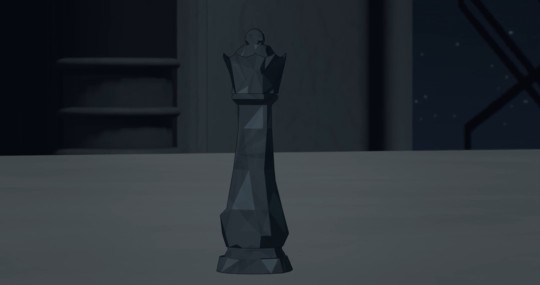
Things just get so much worse from then on. The group splits with JNR going off to find Oscar and, admittedly, I was shocked we got that at all. I mean yeah, it’s setup for the final reveal at the end of the episode, but the fact that anyone remembered Oscar was missing---let alone happily went off to find him---was still a surprise. So only Team RWBY heads back to Ironwood’s office where they find him (rightfully) panicking over the queen on his desk. Weiss tries to baby him, acting like he’s freaking out over nothing, when all these characters should recall precisely what Ironwood himself points out: the last time we saw this symbol it was a message that Beacon had fallen. He’s not paranoid here. He’s entirely justified in his panic. Ironwood likewise points out that they may have been duped into bringing thousands of people into Atlas as easy targets and Vine agrees, setting up that the Ace Ops are on Team Ironwood throughout the course of this conversation. Not out of blind loyalty, but because he’s right. That is a concern. That may be the plan. We do need to try and do something about that. Team RWBY, however, isn’t convinced.
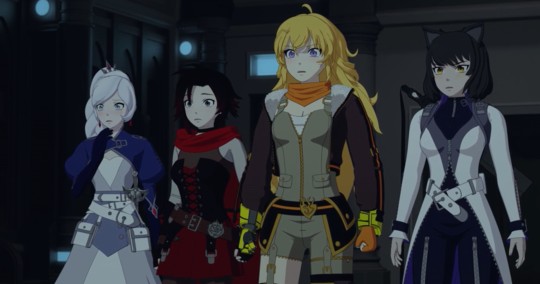
That is, until Ruby realizes that the chess piece is made of black glass. Which means Cinder left it. Normally I’d congratulate her on that deduction---it is the one smart move we see Ruby pull this whole episode---but I just hate what follows. Namely that Ruby and Ruby alone controls her team’s opinions on a situation. Again. We saw it back in the snow, then again when Blake announced in the elevator that they’d do whatever she wanted. Team RWBY is the one who blindly follows their leader, not the Ace Ops, the only exception being Blake and Yang going rogue in regards to Robyn, but we see that hive-mind mindset here again. Ironwood brings up a good point? Nothing. Ace Ops support that point with more logic? Nothing. Ruby supports it? Oh, suddenly Weiss and Blake are taking this seriously. Suddenly Yang is fired up and ready to do whatever is necessary. Ruby controls the room. It’s only when she’s on board that her teammates decide this is worth getting riled up about.
Which, as I’ve said before, is a horrible way to write a diverse group. Especially when the writing is trying to paint the Ace Ops as mindless soldiers. For all their claims that they just have to follow orders, they’re the only ones parsing through this situation and coming to their own conclusions. It’s just that their conclusions do end up aligning with Ironwood’s which is the “bad” take in this scene. Team RWBY, however, waits until their leader makes a decision and then simply rides her cloak tails. The day that Blake, Yang, or Weiss legitimately disagree with Ruby---not a token “Are you sure we should keep secrets from Ironwood? We’re not actually challenging this. Just checking in”---is the day the writing will disagree with her. AKA, no time soon.
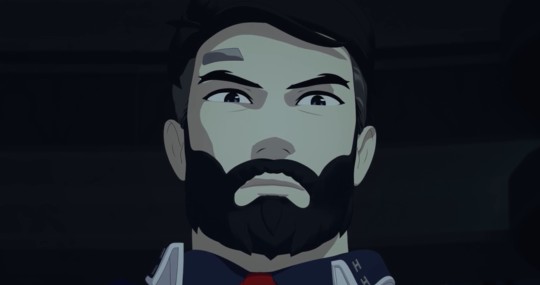
Blake tries to give some bland reassurance about them all being with Ironwood to which he responds, “Are you with me? How did Robyn know about the global communications tower?” Thank you! Thank you for giving us Ironwood’s characterization back and acknowledging that he has no reason to buy their generic ‘Got your back’ statements when everything they’ve done this volume has proven otherwise. They don’t support Ironwood, only themselves and their own teams. The minute he does something they don’t like he’s chucked under the bus. Too bad the writing doesn’t acknowledge any of this and instead continually paints the group as being justified in their decisions. It’s that hypocrisy again. When the group yells at Ozpin for keeping secrets we’re supposed to be on their side. When the Ace Ops yell at the group for keeping secrets we’re... still supposed to be on their side.
Weiss tries to diffuse the situation with “None of this matters right now!” which is real rich when they were just complaining about Ironwood not telling them why they were called back. They get to worry over that, but Ironwood isn’t allowed to worry about them outright betraying him? “Loyalty always matters!” he shouts back and he’s right. Why should Ironwood trust them to have his back in this crucial moment when they’ve never had it before? I’m already seeing more of this hypocrisy among the fandom. When Ozpin kept secrets and told lies the group was given a whole volume to be pissed about that and fans still, to this very day, insist that it hasn’t been enough time for them to get over it, to regain even a portion of that trust. But now that Ironwood has been lied to and betrayed in the same manner? People are annoyed that he’s not just shrugging it off. How dare you not get over in thirty seconds what our heroes got weeks to work through. His inability to just suck it up, as it were, is used to make him seem irrational here. I don’t see anyone, characters or fans alike, acknowledging that his anger is as righteous as the group’s was out in the snow. That there is the disconnect.
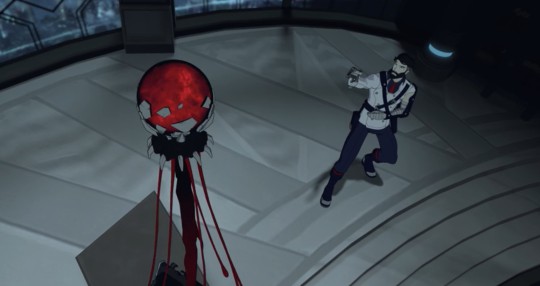
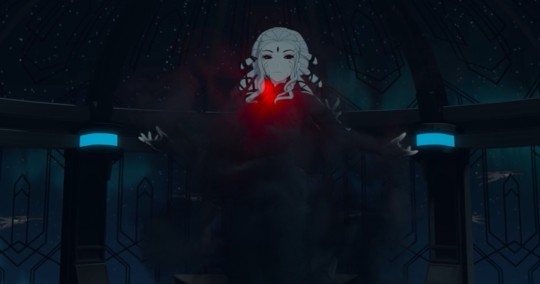
Of course, something has to break the tension. Drawn by all the fury and fear, a grimm pops out of Watts’ bag. A fail-safe for if he was defeated and captured. Salem immediately takes control of the grimm and kills it, using its form to appear before them. She reveals that it doesn’t matter that her men were captured. They were just there to “set the stage,” which they’ve done. Still doesn’t explain the random Penny side plot to my mind (seriously, why did the story bother to resurrect her when she has done nothing plot-wise or emotionally?), but whatever. Much more importantly, the stage is set for Salem herself. She’s approaching with the grimm army we saw her amassing which is... iffy.
First off, why? Why after a thousand years has she suddenly changed her MO from keeping to the sidelines to a full-on attack? Again, what’s the catalyst for that massive change? We don’t know. Meanwhile, from a writing perspective, I’m hesitant about having our Big Bad thrown into the mix before the finale. We know there are plenty of volumes left in this series, which automatically undermines any battle they might have with Salem. Will they win?? Of course not! Because RWBY isn’t over yet. Granted, this could all just be a ruse of some sort. Maybe Salem just wants them to think she’s approaching with an army, which would be much more up her alley in terms of long-distance manipulation. But if not... seriously, what’s the point of that?
Here’s hoping it’s a bluff.
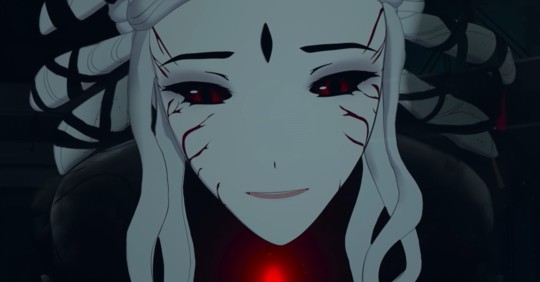
Speaking of manipulation, we get a fantastically creepy moment where Salem tells Ironwood to “simply accept the futility of your situation” while smiling like a kind mother. That’s the Salem who is truly dangerous. Ironwood reaffirms that he won’t give up the relics and Ruby pips up with, “We don’t have to kill you to stop you.”
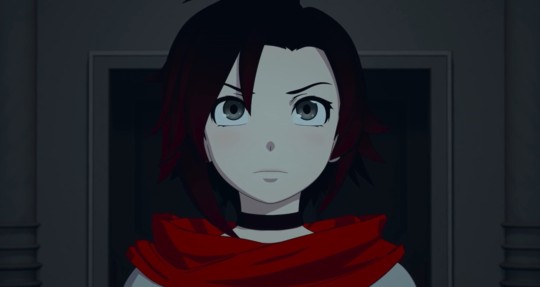
Hey wait. I’m gonna give you all another graphic.

This is Ozpin’s stance! This is his plan! His version of hope! We spent all of Volume Six having the cast beat on him for, “Omg Salem is immortal?!” and with the exception of Nora’s comment, no discussion of this in Volume Seven... but now suddenly Ruby is making this announcement? The group came to this revelation sometime off screen which we a) don’t get to see and b) once again created no scenario in the form of, “Wow! Ozpin was right all along! Maybe we should go talk to him...”
I’m just... wow. The number of times the writing takes what the group and the adults do, the exact same perspectives and decisions, and twists it so that the group comes out looking like heroes and the adults look like misguided, unhinged fools who need to be put in their place... I’m really over it at this point. And by extension the group themselves. Their characterizations have been so badly mangled at this point I legitimately don’t like them as people. I don’t care if they say they want to protect Mantle, or if they say they’ll support Ironwood, or if they say they’re unsure about their choices. All their actions claim otherwise.
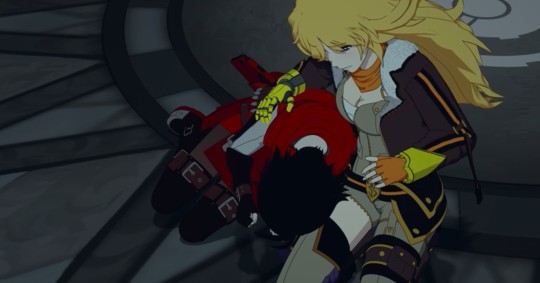
Rather than grappling with the huge revelation that the group is apparently no longer obsessed with Salem’s immortality (or rather that Ruby isn’t. The rest of the group doesn’t actually matter. As established, they sync up with her beliefs the second she announces them), we return to Summer Rose. Salem goes, “Your mother said those words to me” and Ruby... loses it? What? I would have been 100% on board with this if we’d gotten it last Volume because then we saw Ruby losing her cool periodically. The smashed alcohol bottles. Chucking her scroll. Screaming at Qrow. That was all building to something. But then we had a year and roughly twelve episodes of normality. Ruby jumps into her fight with Cordovin and has been fine ever since. Hell, she’s been bubbly and confident, goofing off with Penny in one episode, then giving strong orders to her team in another. The one time we see her falter was in her conversation with Qrow and he reassured her completely that she was both doing the right thing and in no way comparable to Ozpin. Now, suddenly, one line from Salem and Ruby collapses? Full on incapacitated? I could buy the crying while still standing strong, I could buy a collapse if we’d kept her characterization going from Volume Six, but this kind of reaction in this context just felt so extreme. Doesn’t help that I really wasn’t sold on the voice acting here. Those cries sound less like devastated sobs and more like weird hiccups. Not to rag on Lindsay. On the whole I think she does a really excellent job as Ruby, it’s just this particular moment didn’t read right to me. I didn’t feel Ruby’s supposed grief here.
So that was... a lot for one line from Salem in a volume of otherwise confident and cool-headed Ruby. We also don’t see it amounting to anything, as per usual with RWBY’s writing. Ruby isn’t out of commission for the rest of the conversation or anything. She pops right back up after a second in Yang’s lap, just as confident and go-getting as before. There was no lead up to this and there are no consequences for the breakdown. Rooster Teeth honestly seems to think they can just chuck random things into the story---Ruby needs to show emotion at some point!---and then just leave it at that, entirely disconnected from everything else around it. Would we have known that Ruby just had her first breakdown of the series a minute later while once again betraying Ironwood? Nope.
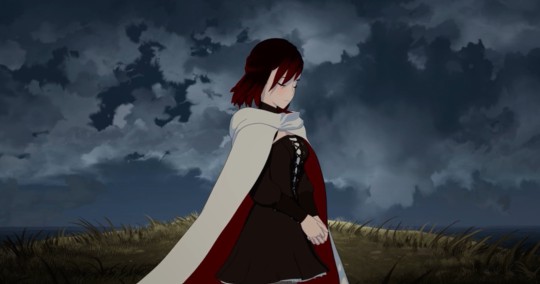
Finally, this scene shows us again that the Argus battle was a bunch of nonsense. Ruby’s eyes nearly activate when she’s grieving for her mother, imagining---or perhaps seeing via Salem?---a sad Summer, not a smiling one. Just like her eyes activated while seeing Pyrrha die. Just like they activated when Blake was nearly killed by the Apathy. They activate now while thinking about her mother’s death. The montage of happy moments in lieu of the sad ones not working last volume was entirely out of place.
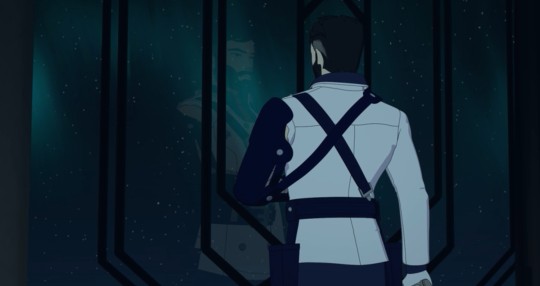
Salem finally leaves. Now everyone is panicking about this army. Elm points out that they’ll know if anything approaches. Vine checks and realizes that Watts took out their perimeter. Either that or Salem has already destroyed everyone and everything out there. It’s impossible to know. During all this Blake asks if the Amity tower is actually finished and we get more nonsense about how Ironwood is evil for telling a lie, but the group is always justified in telling theirs. The writing really tried to compare Ironwood telling Mantle---who I guarantee 100% does not care about whether a communications tower is finished while they’re getting attacked by grimm---a lie to lure out one of their biggest threats to Blake and Yang going behind Ironwood’s back to tell a potentially non-trustworthy outlaw about said tower, risking that the information would fall into the wrong hands and doom the project before it could be completed either way. Those are not in any way comparable situations, yet the writing really has Weiss going, “General Ironwood?” in a ‘How could you betray us like that?’ tone while Yang continues to look pissed.
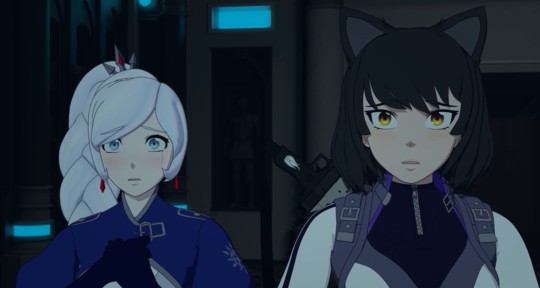
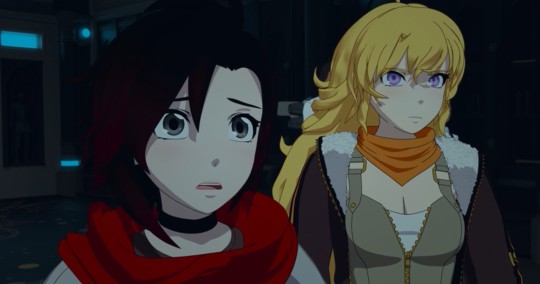
And as if they didn’t know! How is this a personal betrayal? They were all helping to build that tower. Surely they’d know it it was that close to being done. Again, critical thinking skills, people. Anyone with two brain cells and their insider information should have looked at Ironwood’s announcement and gone, “Oh, that must be a bluff. Just a few days ago we were arguing about whether to continue taking resources from Mantle. No way is Amity ready. He’s going after Watts. Who is indeed the much bigger threat. Considering that he has control over the entirety of our technology and there’s literally no downside to telling Mantle about a finished tower when they’re getting devoured by grimm.” This is another, “But lying is wrong!” in the face of “But lying kept us alive...?”
Does everyone get what I’m saying here? How RWBY takes these situations and tries to paint them in an absolutely ridiculous light, expecting the audience to blindly accept this perspective despite everything else they’ve seen for themselves? Like, two episodes ago? I swear I’ve never encountered writing that treats its audience this badly. Scene after scene relies heavily on the viewer having no ability to think for themselves. Just accept that Ironwood is a horrible person for lying about the tower even though there are no repercussions for that and we JUST watched him defeating Watts as a result. Like, five minutes ago. That just happened. In this episode.
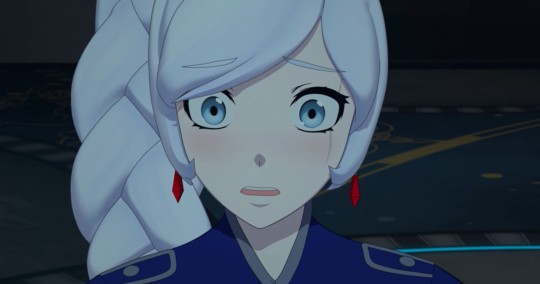
Ironwood then drops the bomb that Winter has gone off to claim the Maiden power. Interesting development. I wonder what that means exactly. Is she just going to lock herself away until the Maiden dies naturally? Do they have her on some sort of life support and is there an agreement to pull the plug if necessary? Are they going to use a machine similar to the one Pyrrha was in and try to force the change early? Or is this just a misleading comment and Winter is merely off to protect the Maiden, no intention of taking the power now? Who knows. We’ll have to wait until next episode to find out.
Ironwood likewise announces that the staff and the lamp need to be locked away now that they’re compromised, even though they’ve been compromised since they first saw Tyrian in Mantle. Insert another [this scenario is so stupid and contrived] explanation here. It’s made worse by Ruby’s childish “You said we could keep it.” Excuse me? What, did you think the lamp was your personal property now forever and always? Is Ruby really sitting there arguing that something Ironwood told her weeks ago trumps the obvious logic of putting the relic where it’s somewhere safe? That’s the characterization we’re going for, a leader who cares more about, ‘But you said we could have it!’ over the fate of the world? What even is this? The fact that Ironwood has to explain to them that the situation has changed just reinforces the group’s overall attitude. That is, one of arrogance and importance. They literally need to be told why putting the relic in a nearly impenetrable vault is better than letting them have it just because they want it. Plus, you know, they lied about the lamp from the start. So there’s that too.
Finally, Ironwood reveals that Amity was originally a plan of Ozpin’s but he didn’t push it far enough. Instead, he intends to use the staff to lift all of Atlas instead, hopefully taking two relics and a Maiden far out of Salem’s reach. Ruby wants to use the tower for its designed purpose instead, which is only a valid option in her mind because the writing was stupid last week. If there had actually been any logic there---if people had been allowed to react naturally and in a variety of ways to the Salem announcement, rather than a super convenient “Yeah! Let’s all work together!” across an entire, panicking city---she wouldn’t be quite so eager to tell the whole world. But we all know at this point that logic bends to the protagonists’ whims, so Ruby wants that same perfect ending across all of Remnant. She stands her ground, as does her team. Obviously.
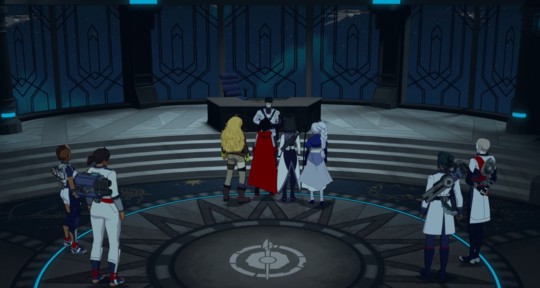
Meanwhile, the Ace Ops aren’t just following Ironwood’s orders like the writing wants us to think via Harriet’s earlier comment. Rather, they’re each thinking through the situation for themselves and making very good points. If Salem has taken out our perimeter than we know our tech and people don’t stand a chance against this army. We just finished up the fight in Mantle and none of us are in a position to start another. Notably, Harriet brings this up, the one whose aura took a massive hit while nearly getting crushed underfoot. Vine points out that sometimes you have to lose a battle to win the war, but Team RWBY, to be blunt, simply doesn’t care.
I’ll be blunt myself here too: I don’t have an easy solution to this particular scenario. I don’t know what the “right” or the “wrong” choice is. Weighing starting a fight with VERY high stakes you’ll lose against abandoning the people of Mantle is just a straight up horrific decision. Like so much of what Ozpin faced, there is no clear-cut, good answer here. Do you stand by the people and risk the world, or work to save the world and doom the people? I don’t know and I do commend Rooster Teeth for writing a difficult choice... just not in giving each side the weight it deserves. Because as said, we’re meant to root for Team RWBY, always. Theirs is presented as the “right” choice every time, despite the fact that, as established, this is far from a black and white decision.
What frustrates me the most is when faced with all of these logical and very important considerations (we might not have backup, we’re in no position to fight, if Salem gets the relics and another Maiden the world is screwed) the group won’t even acknowledge these things. They’re so set in their own perspective they won’t even give these HUGE concerns the time of day. Rather, Yang shoots back, “You can’t just back down from a fight!”
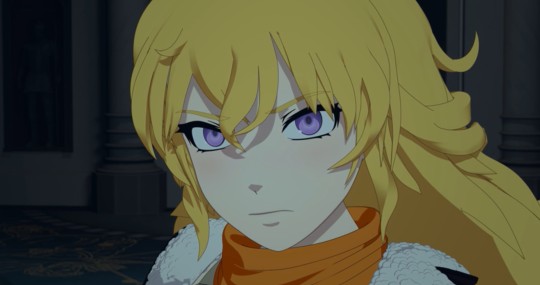
That’s it. That’s the group’s problem in a single line.
This is what got Pyrrha killed.
It’s something the group should remember. She also insisted on fighting when she should have retreated and, since this was back during the days when characters actually faced consequences for their actions, it cost Pyrrha her life. Granted, going after Cinder was a truly useless endeavor. Pyrrha achieved nothing with her sacrifice. Here, Team RWBY hopes to save the people of Mantle, adding a clear justification for their insistence on fighting... but this is nevertheless indicative of that larger “punch it until it stops moving” mindset. It’s not that they decide to fight instead of retreating that’s the problem, it’s that to their mind fighting is the only option. Ever. This is what led to them attacking Cordovin and destroying Argus’ mech, drawing a massive grimm in the process. When faced with the option of backing down, Team RWBY doesn’t consider that an option at all. Which is heroic when up against an actual enemy, far less so when you’re facing an ally and the choice to fight has serious repercussions attached to it. Hell, the group doesn’t even consider compromises. They could have easily acknowledged that collecting the relics, the Maiden, and getting the staff to work on Atlas will take time. You do that while we focus on evacuating the rest of Mantle to the city. But no, even the concept of a compromise simply isn’t possible. You just always fight. Straight up. Anyone who suggests anything less isn’t a true huntsmen. “We’re loyal to the people!” Ruby shouts, as if “the people” doesn’t also include the rest of the world that Ironwood is trying to save and that they’re endangering by keeping the relics and Maiden within Salem’s reach.
That is one messed up perspective to tout in a story infused with the complex and the morally gray.
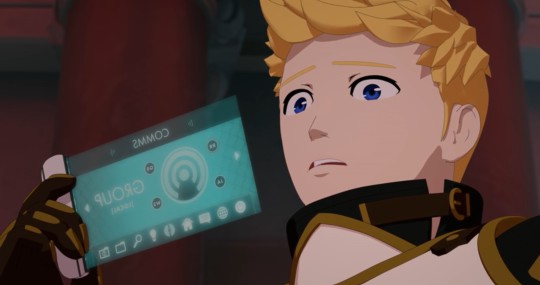
The real kicker though? Ruby’s ‘My way or the highway’ attitude obliterates a solution that fell straight into her lap. Jaune calls and says straight out that they have another situation. If Ruby had listened to her teammate for just three seconds they all would have learned about Oscar, thereby undermining Ironwood’s plan. He can’t keep the lamp safe if he doesn’t know where it is. You look for it while, again, we evacuate Mantle. Then we take everything out of Salem’s reach. Win-win. Instead, Ruby blasts her way through the situation. Literally, dodging Ironwood and hiding behind his desk shouting a highly bias version of his plan in the hopes of getting everyone on her side. And it works.
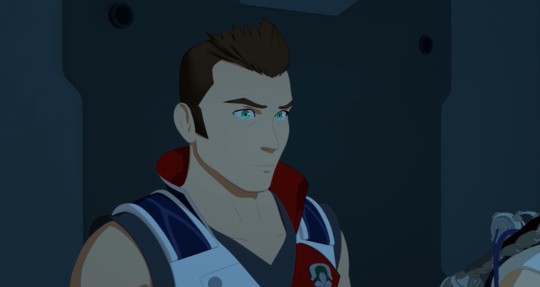
Because those like Clover don’t get to hear any of that context. Like how the perimeter is gone, there’s an army potentially coming, no one is in a position to fight, we’ve already lost a relic... they just here a Ruby’s version of events that paints Ironwood as the callous man Robyn thought he was---oh my god he’s abandoning Mantle for no good reason!---and people will react accordingly. Ruby likewise doesn’t care that shouting such information over all channels does things like, say, clue Tyrian into their plan. She just wants to do things her way, right now. Pausing to think (because thinking isn’t fighting) simply doesn’t happen.
I used to adore Ruby as a hero. Someone who was intrinsically good, hopeful, and wickedly clever in her ability to come out on top. Now she’s stubborn, arrogant, at times cruel, and charges in headfirst like her sister, refusing to consider any perspective other than her own. And her team endlessly supports that. The writing endlessly supports that. This isn’t our hero working through her flaws, but rather a flawed character that the writing refuses to acknowledge is flawed. When Ruby flies behind Ironwood’s desk the music rises triumphantly, just like it did when she attacked Cordovin’s mech. When Ironwood announces that they’re under arrest, Ruby spits back, “We won’t just let you take us” and we’re supposed to cheer.
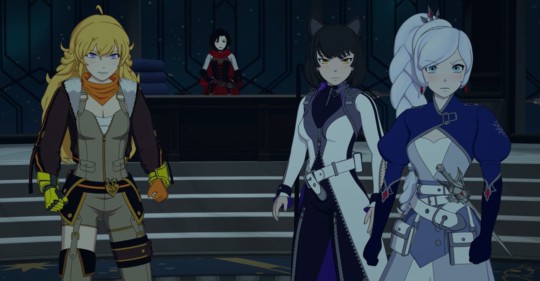
Which brings us back to the question of whether the group really faced consequences here. Let me give you all a random, non-RWBY example of two scenes. Scenario One:
Parent: You punched her?
Teen: She insulted me!
Parent: I understand that, but that doesn’t mean you were justified in attacking her.
Teen: Oh, I was.
Parent: Maybe you were, maybe you weren’t, but you can’t solve all your problems that way.
Teen: I... I know that, okay. Back off. I just get so angry...
Parent: I know. We’re going to work on that. You’re grounded this weekend. We can discuss this more then.
Teen: [sighs] Fine.
vs. Scenario Two:
Parent: You punched her?
Teen: She insulted me!
Parent: I understand that, but that doesn’t mean you were justified in attacking her.
Teen: Oh, I was.
Parent: Maybe you were, maybe you weren’t, but you can’t solve all your problems that way.
Teen: Screw you! It worked didn’t it? I think a good punch goes a long way.
Parent: That’s not... okay look. You’re grounded this weekend so---
Teen: Like hell I am. [Proceeds to run off]
Teen: [Later to friend] ---and then she tried to ground me? Can you believe that?
Friend: Holy shit what an asshole.
If we put aside my own iffy dialogue for the moment, Scenario One acknowledges the complexity of the situation while likewise pointing out that the teen didn’t handle herself well. RWBY has achieved that here: the ethics of this scenario are acknowledged as complicated, but the group did things they shouldn’t have, as evidence by Ironwood’s anger and the Ace Ops’ criticism. However, Scenario One goes on to let the teen acknowledge that mistake, thereby validating it in the first place. A consequence is set, grounding, and they accept that, thereby further validating that their behavior needs work. They accept the consequence because both they and the writing acknowledge that the consequence is deserved. It takes what was previously two subjective stances---they say I’m wrong, I say I’m right---and encourages the audience to find the middle ground. Neither was totally wrong or right. The teen might be justified in some respects, but still made mistakes in others. She needs to improve.
RWBY, however, steers firmly into Scenario Two wherein the teen (Team RWBY) insists points blank that they never made mistakes in the first place, thereby encouraging the audience to question whether Ironwood and the Ace Ops (the parent) is right to be calling them out at all. We see no humility or guilt, only confidence. Ruby shouting “No!” at Cordovin when she’s told to surrender. Yang keeping silent after admitting that she and Blake told Robyn, not bothering to apologize or admit that this might have been a breech of trust. They challenge the validity of the claim that mistakes were made and by virtue of being protagonists encourage the audience to challenge it too. Finally, we see them reject the consequence because they will not admit that it’s deserved. The teen will not accept a grounding. Ruby: “We won’t just let you take us.” We’re then told by others that this rejection was warranted. The friend reinforces the view that the teen was right to run because that punishment is undeserved. The message is, “You never did anything wrong in the first place.” The plot of RWBY likewise reinforces the view that resisting Cordovin’s arrest was right by having her randomly let the group go. The consequence is replaced with a reward and, presumably, we’ll have a similar situation wherein the group either defeats the Ace Ops or is released by them. The consequences never take hold because the writing doesn’t think there should be consequences in the first place. Team RWBY isn’t going to be arrested here. They’re certainly not acknowledging that on some level they deserve to be. We didn’t see that humility while they were cuffed on the airship---that most basic acknowledgement of, “Did we make some mistakes? Could we have done something better? Is Ironwood right to be this mad?”---and there’s none of it now here, either. The tone is pure, “How dare you try and arrest us? We’re the good guys here!”
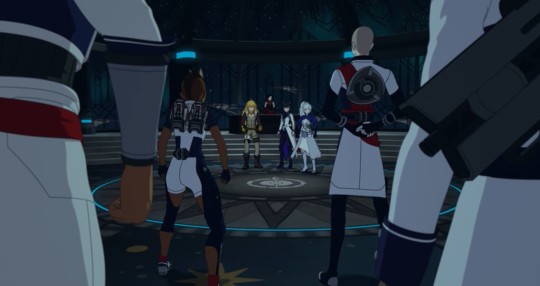
This remains as pro-protagonist as it has been the last two volumes. There are no consequences, only another hurdle for the group to overcome, painted as heroes for doing so. It’s Team RWBY vs. The Ace Ops and there’s no confusion about who we’re supposed to be rooting for. The Ace Ops because the group should rightly be stopped from hindering Ironwood’s attempts to keep the relics and a Maiden out of Salem’s hands, for their own lies and secret keeping that endangered them all this volume? Nope. It’s Team RWBY as the presumed heroes, facing off against soldiers who (supposedly) prioritize orders over what’s “right.”
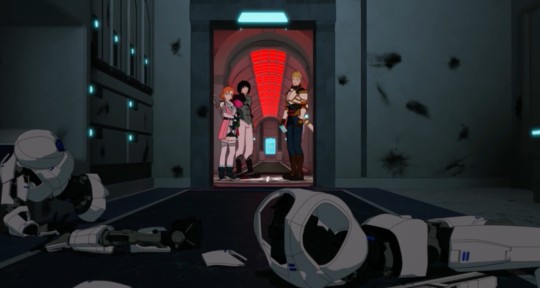
And yeah, Oscar is gone. There are a number of dismantled robots and blaster fire in the room where Neo presumably took him. So unless they do a flashback we don’t get to see if/how Ozpin reacted to this initial attack. I hope they do provide a flashback because otherwise that’s another crucial scene of Oscar’s that happened off screen...
Can’t wait to see what else we’ll end up with next week! Until then, 💜
185 notes
·
View notes
Text
TerraMythos' 2020 Reading Challenge - Book 22 of 26
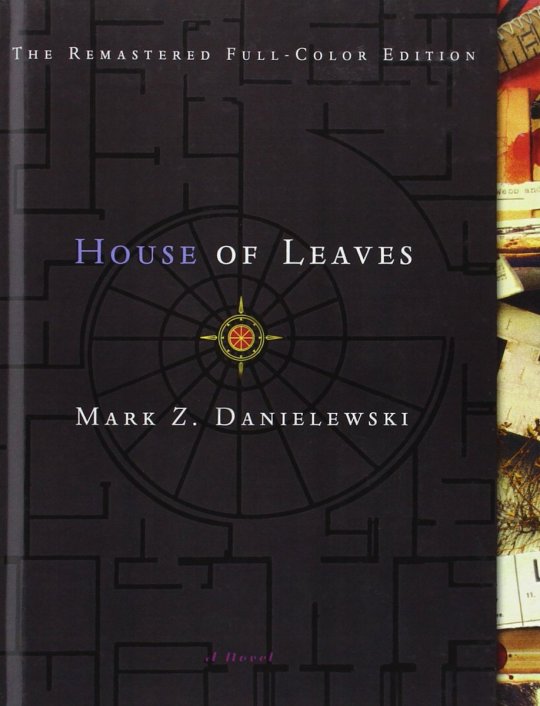
Title: House of Leaves (2000)
Author: Mark Z. Danielewski
Genre/Tags: Horror, Fiction, Metafiction, Weird, First-Person, Third-Person, Unreliable Narrator
Rating: 6/10
Date Began: 7/28/2020
Date Finished: 8/09/2020
House of Leaves follows two narrative threads. One is the story of Johnny Truant, a burnout in his mid-twenties who finds a giant manuscript written by a deceased, blind hermit named Zampanò. The second is said manuscript -- The Navidson Record -- a pseudo-academic analysis of a found-footage horror film that doesn’t seem to exist. In it, Pulitzer Prize-winning photojournalist Will Navidson moves into a suburban home in Virginia with his partner Karen and their two children. Navidson soon makes the uncomfortable discovery that his new house is bigger on the inside than it is on the outside. Over time he discovers more oddities -- a closet that wasn’t there before, and eventually a door that leads into an impossibly vast, dark series of rooms and hallways.
While Johnny grows more obsessed with the work, his life begins to take a turn for the worse, as told in the footnotes of The Navidson Record. At the same time, the mysteries of the impossible, sinister house on Ash Tree Lane continue to deepen.
To get a better idea try this: focus on these words, and whatever you do don’t let your eyes wander past the perimeter of this page. Now imagine just beyond your peripheral vision, maybe behind you, maybe to the side of you, maybe even in front of you, but right where you can’t see it, something is quietly closing in on you, so quiet in fact you can only hear it as silence. Find those pockets without sound. That’s where it is. Right at this moment. But don’t look. Keep your eyes here. Now take a deep breath. Go ahead and take an even deeper one. Only this time as you start to exhale try to imagine how fast it will happen, how hard it’s gonna hit you, how many times it will stab your jugular with its teeth or are they nails? don’t worry, that particular detail doesn’t matter, because before you have time to even process that you should be moving, you should be running, you should at the very least be flinging up your arms--you sure as hell should be getting rid of this book-- you won’t have time to even scream.
Don’t look.
I didn’t.
Of course I looked.
Some story spoilers under the cut.
Whoo boy do I feel torn on this one. House of Leaves contains some really intriguing ideas, and when it’s done right, it’s some of the best stuff out there. Unfortunately, there are also several questionable choices and narrative decisions that, for me, tarnish the overall experience. It’s certainly an interesting read, even if the whole is ultimately less than the sum of its parts.
First of all, I can see why people don’t like this book, or give up on it early (for me this was attempt number three). Despite an interesting concept and framing device, the first third or so of the book is pretty boring. Johnny is just not an interesting character. He does a lot of drugs and has a lot of (pretty unpleasant) sex and... that’s pretty much it, at least at the beginning. There’s occasional horror sections that are more interesting, where Johnny’s convinced he’s being hunted by something, but they’re few and far between. Meanwhile, the story in The Navidson Record seems content to focus on the relationship issues between two affluent suburbanites rather than the much more interesting, physically impossible house they live in. The early “exploration” sections are a little bit better, but overall I feel the opening act neglects the interesting premise.
However, unlike many, I love the gimmick. The academic presentation of the Navidson story is replete with extensive (fake) footnotes,and there’s tons of self-indulgent rambling in both stories. I personally find it hilarious; it’s an intentionally dense parody of modern academic writing. Readers will note early that the typographical format is nonstandard, with the multiple concurrent stories denoted by different typefaces, certain words in color, footnotes within footnotes, etc. House of Leaves eventually goes off the chain with this concept, gracing us with pages that look like (minor spoilers) this or this. This leads into the best part of this book, namely...
Its visual presentation! House of Leaves excels in conveying story and feeling through formatting decisions. The first picture I linked is one of many like it in a chapter about labyrinths. And reading it feels like navigating a labyrinth! It features a key “story”, but also daunting, multi-page lists of irrelevant names, buildings, architectural terms, etc. There are footnotes that don’t exist, then footnote citations that don’t seem to exist until one finds them later in the chapter. All this while physically turning the book or even grabbing a mirror to read certain passages. In short, it feels like navigating the twists, turns, and dead ends of a labyrinth. And that’s just one example -- other chapters utilize placement of the text to show where a character is in relation to others, what kind of things are happening around them, and so on. One chapter near the end features a square of text that gets progressively smaller as one turns the pages, which mirrors the claustrophobic feel of the narrative events. This is the coolest shit to me; I adore when a work utilizes its format to convey certain story elements. I usually see this in poetry and video games, but this is the first time I’ve seen it done so well in long-form fiction. City of Saints and Madmen and Shriek: An Afterword by Jeff VanderMeer, both of which I reviewed earlier this year, do something similar, and are clearly inspired by House of Leaves in more ways than one.
And yes, the story does get a little better, though it never wows me. The central horror story is not overtly scary, but eeriness suffices, and I have a soft spot for architectural horror. Even Johnny and the Navidsons become more interesting characters over time. For example, I find Karen pretty annoying and generic for most of the book, but her development in later chapters makes her much more interesting. While I question the practical need for Johnny’s frame story, it does become more engaging as he descends into paranoia and madness.
So why the relatively low rating? Well... as I alluded to earlier, there’s some questionable stuff in House of Leaves that leaves (...hah?) a bad taste in my mouth. The first is a heavy focus on sexual violence against women. I did some extensive thinking on this throughout my read, but I just cannot find a valid reason for it. The subject feels thrown in for pure shock value, and especially from a male author, it seems tacky and voyeuristic. If it came up once or twice I’d probably be able to stomach this more easily, but it’s persistent throughout the story, and doesn’t contribute anything to the plot or horror (not that that would really make it better). I’m not saying books can’t have that content, but it’s just not explored in any meaningful way, and it feels cheap and shitty to throw it in something that traumatizing just to shock the audience. It’s like a bad jump scare but worse on every level. There’s even a part near the end written in code, which I took the time to decode, only to discover it’s yet another example of this. Like, really, dude?
Second, this book’s portrayal of mental illness is not great. (major spoilers for Johnny’s arc.) One of the main things about Johnny’s story is he’s an unreliable narrator. From the outset, Johnny has occasional passages that can either be interpreted as genuine horror, or delusional breaks from reality. Reality vs unreality is a core theme throughout both stories. Is The Navidson Record real despite all evidence to the contrary? Is it real as in “is the film an actual thing” or “the events of the film are an actual thing”? and so on and so forth. Johnny’s sections mirror this; he’ll describe certain events, then later state they didn’t happen, contradict himself, or even describe a traumatic event through a made-up story. Eventually, the reader figures out parts of Johnny’s actual backstory, namely that when he was a small child, his mother was institutionalized for violent schizophrenia. Perhaps you can see where this is going...
Schizophrenia-as-horror is ridiculously overdone. But it also demonizes mental illness, and schizophrenia in particular, in a way that is actively harmful. Don’t misunderstand me, horror can be a great way to explore mental illness, but when it’s done wrong? Woof. Unfortunately House of Leaves doesn’t do it justice. While it avoids some cliches, it equates the horror elements of Johnny’s story to the emergence of his latent schizophrenia. This isn’t outwardly stated, and there are multiple interpretations of most of the story, but in lieu of solid and provable horror, it’s the most reasonable and consistent explanation. There’s also an emphasis on violent outbursts related to schizophrenia, which just isn’t an accurate portrayal of the condition.
To Danielewski’s credit, it’s not entirely black and white. We do see how Johnny’s descent into paranoia negatively affects his life and interpersonal relationships. There’s a bonus section where we see all the letters Johnny’s mother wrote him while in the mental hospital, and we can see her love and compassion for him in parallel to the mental illness. But the experimental typographical style returns here to depict just how “scary” schizophrenia is, and that comes off as tacky to me. I think this is probably an example of a piece of media not aging well (after all, this book just turned 20), and there’s been a definite move away from this kind of thing in horror, but that doesn’t change the impression it leaves. For a book as supposedly original/groundbreaking as this, defaulting to standard bad horror tropes is disappointing. And using “it was schizophrenia all along” to explain the horror elements in Johnny’s story feels like a cop-out. I wish there was more mystery here, or alternate interpretations that actually make sense.
Overall The Navidson Record part of the story feels more satisfying. I actually like that there isn’t a direct explanation for everything that happens. It feels like a more genuine horror story, regardless of whether you interpret it as a work of fiction within the story or not. There’s evidence for both. Part of me wishes the book had ended when this story ends (it doesn’t), or that the framing device with Johnny was absent, or something along those lines. Oh well-- this is the story we got, for better or worse.
I don’t regret reading House of Leaves, and it’s certainly impressive for a debut novel. If you’re looking for a horror-flavored work of metafiction, it’s a valid place to start. I think the experimental style is a genuine treat to read, and perhaps the negative aspects won’t hit you as hard as they did to me. But I can definitely see why this book is controversial.
7 notes
·
View notes
Note
Longtime follower, big time fan! I love your writing and I wanted to know what you would suggest or have any tips or recommend about how to start writing a book? I want to (and have a bit of an idea) but I don't know where to begin?? Thank you!!

I want to start this ask, first with thanks and then with a disclaimer. Firstly, thank you so much for following me and for reading/enjoying my stuff! I really appreciate it and it makes me feel very warm-and-fuzzy to know that someone on the other end of the internet reached out to me and thought highly enough of my writing to ask for advice. Secondly, I am a writing teacher. I teach high school creative writing and have degrees in English and Secondary English Education. I have written numerous short stories and one day hope to get a PhD in English or an MFA in creative writing. On the one hand, I am Supremely Qualified to answer your question. On the other, I’m... not. I am not a published author (yet) and most of my writing energy goes towards roleplay and fanfiction. The longest finished work I’ve created as an adult is my “Wooden Overcoats” fanfiction “The Greatest Undertaking”, which doesn’t “officially” crack novel length (50,000 words, give or take). When you say you seek advice on writing advice, I’m going to tell you something I’d never tell my students: you don’t have to take my advice. If something else works better for you (this part I do usually tell them), do that. I am not and no writer is the font of all writing knowledge. Anyone who says they are is trying to sell you something, usually, a book on how to write, written by an author you’ve never read or heard of.
Okay, now that that’s out of the way... let’s talk about what helps me in hopes that some of it helps you!
Don’t be afraid to start. People will make you feel like your idea isn’t worth pursuing. Most of them are doing it on accident and would be horrified to know that their thoughtless comments are holding you back. For years, I did not write characters who had parents because when I was eleven, my mom read a fanfiction I wrote and the main character was critical of her parents and my mom asked me, “Is this how you feel?” If a circumstance hit too close to home, I didn’t write it even if my mom wasn’t going to read it. Thankfully, I’m past that. People won’t be the only thing that will hold you back. Time, fear of failure, impostor syndrome... all sorts of insidious things will give you excuses not to start. Do not let them win.
Some form of pre-planning is extremely useful! It’s not necessary. Most of my short stories have never been outlined. I just sit at the keyboard and type until I have a short story and then I edit later. But for my longer stories, I find an outline keeps me organized and on track. Currently, I’m writing a story called “Catch and Release”. “Catch and Release” has two separate outlines (I kept the original, even though I scrapped at least half of it), both about five pages long. The outlines, for me, include character summaries (who is this character, what did they do in the last story- “The Greatest Undertaking” - that is relevant, what is their goal now, how do they perceive themselves/others, how do others perceive them, what other details are important), and chapter summaries with bullet-point lists of what plot points and emotional beats need to happen in each chapter. I did this in Google Docs because it means I can access it anywhere (and often do) and so I can use the strikethrough function to cross off plot points and emotional beats I’ve hit in writing. This keeps me on track when I take breaks from writing. I haven’t worked on the writing since a little over a week ago, since real life has picked up. I opened Chapter Nine the other day and was like, “Why did I start with Sid Marlowe?” I checked my outline and remembered exactly where I left off. It’s nice. I wasn’t as thorough with “The Greatest Undertaking” and there was a point where I took a month-long hiatus from working on it (I was teaching remotely from a different city because of the pandemic) and when I picked up “The Greatest Undertaking”, I thought to myself “What would have made writing easier for me?” Your outline doesn’t have to be as detailed as mine. It could be more detailed. Just create a guidebook for yourself in case you get stuck or have to take a break from your work.
Speaking of preplanning... Brainstorm! Keep a list of your ideas for future fics/stories/etc. Write little plot summaries to refer to later. I like to you the “[Somebody] wanted [goal], but [obstacle], so [climax], then [ending].” model when I’m too busy to write a detailed summary. I’d also recommend looking at and utilizing traditional outlines, like Freytag’s pyramid or the “four-act structure” a professor suggested to me at a Shakespeare conference if you want to push back against traditional storytelling that allows for a longer focus on the resolution/consequences as the characters establish a new normal. Something. Anything to make you know what ideas you have and what shape they might take. Pictures can be helpful!
Even though preplanning is useful, don’t get married to your outline. If you love your outline too much, you might spend all your time working on it instead of the story or you might not give yourself the flexibility you need and deserve to write the story of your dreams. I realized when I was writing “Catch and Release” that I needed the latitude to add in a scene between Chapman and Calliope and to have Chapman and Antigone interact at least once in the series, since they didn’t in “The Greatest Undertaking”. I was able to edit the outline easily enough to add a whole chapter (Chapter Nine, which I’m working on). I might have to add up to three more chapters to hit all of my bullet points and I know my ending has changed from the first outline. That’s okay! As long as I keep writing and preserve the emotional beats, I’ll be content. Some people would hate this edit-as-you-go approach and insist upon sticking to the outline. If that works for you, great. But I’m not going to commit myself to subplots that don’t serve the narrative.
Decide if you’re a plot-driven or character-driven writer (or, rather, if your piece is plot-driven or character-driven). I’ve put so much emphasis on outlining plot in this thing because I’m character-driven. I am constantly thinking about “but why are they like that?” and “What motivates character X? What is their payoff if they act?” I think in terms of character relationships. This is great! Super helpful! But when it comes to getting my characters do things... I need to outline a plot otherwise they will sit around and talk about their feelings for 30,000 words and nothing will happen. I compensate by making sure my characters have goals outside their intimate relationships, other interests/hobbies/struggles, and lots of things to do. In “Catch and Release”, I had to think of an event that would allow my characters to act out their feelings, rather than think about them privately. If you’re more plot-driven, you will need to make character outlines to keep track of why your characters are doing things that they do and to keep them somewhat consistent in how they behave. People in real life are sometimes inconsistent. In fiction, readers are more likely to notice “out of character” behavior... especially if it isn’t tied to an important motivator. You might need to make character arcs instead of a plot event list. And that’s okay! Do what you need to do to make sure that whether you’re plot- or character-driven, the two tie nicely together.
Practice writing and read a lot. There are two ways to become a better writer. The first is my favorite: write a lot. In between short story projects and novella/novel-length fics, I write my RP characters here. I experiment with style and voice and character development here all the time. This is my “take a break from writing” writing corner, lol. It’s made me a lot better and the partners with whom I write make me better. It keeps me in continual practice with both story craft and mechanics. The second way to improve as a writer is to read a lot. I’m going to say something my colleagues would probably hate: watching TV and listening to podcasts counts as reading, too. Study how the author or writers craft the book/episode/movie you’re consuming. Look at the dialogue and plot structure. Imitate the parts you like, mix and match pieces of media, use one author’s style to tackle another’s subject material. Decide what you think is good writing and what you think isn’t. I’m having my students do an activity from the book called “No Plot? No Problem!” by Chris Baty, the founder of National Novel Writing Month. It asks writers to list all their favorite tropes, conventions, stylistic choices, etc. and all their least favorites and then to only include things they listed as favorites and to avoid writing about things they hate. Writing is a self-betterment activity, but you don’t get better by punishing yourself. You want to enjoy writing, right? Don’t “write what you know”. Write what you know, what you love, and what you want to know more about! Imitating writers you admire is a good thing for both original and fanfiction. Practice, practice, practice!
Set goals for yourself. I have an app called Habitica to help with my to-do lists. I have three things that are writing-related on it right now: “Respond to writing prompt” (habit), “Work on creative project” (daily), and “Finish Catch and Release” (singular event). On Habitica, you rank the level of ease for each thing. “Respond to writing prompt” is “easy”. It can be a prompt here, working on a chapter of “Catch and Release”, or doing a separate writing prompt. “Work on creative project” is “medium” and can be any of the above... plus outlining or another artistic expression, because sometimes I forget to branch out. I can’t check “Catch and Release” off my list until I finish the actual story and that’s ranked as “difficult”. I get a different amount of points for doing the things I need to do and I lose points for not doing them. I also (unofficially) have a goal that all of my chapters must be between 2000 and 5000 words. There’s no formal system for that one. Either way, these keep me motivated to keep writing. Find a system of accountability for yourself. Some people do well if they reward themselves (I don’t. There’s nothing I want enough to work for except things that have intrinsic rewards, like... I get to keep my job if I do my job. Telling me that is more motivating than telling me I’ll get ice cream for finishing my lesson plans. I can get ice cream even if I don’t. I’m an adult with a modest amount of disposable income or I’ll decide I don’t want ice cream. The only times I’ve done this self-denial tactic and seen results I also dehydrated and deprived myself of sleep. I do not recommend that in the slightest). Others thrive on working competitively against friends, the clock, or themselves. Still others accomplish their goals only by having external people hold them accountable. I will admit: I sometimes need a shove from a friend which is why...
Enlist friends to get opinions from. I have the world’s best group chat on Discord. All three of them are writing partners here and familiar with my fandom (”Wooden Overcoats” in this instance; though at least two of them are familiar with “Phantom of the Opera”/Susan Kay’s “Phantom” and I’ve forced the whole group to know about my original characters). Each of them has a different perspective so I can ask their thoughts and brainstorm with them, throw ideas at them, etc. or just ask them to make sure I’m writing once a week or so. I have other friends who know nothing about my fandom or my stories but who are willing to listen objectively to look for plot holes. And then I have friends who are content to know I’m writing and never ask for more info. Writing is such a solitary activity that it’s important to find support and community where you can!
Believe in yourself. You can have all the support in the world, but you have to remind yourself that your story is worth telling and that no one can tell it quite like you can. Get writing!
I wish you the absolute best of luck on your writing endeavors! If you ever want to talk or follow up, I’d love to hear how it’s going! Take care!
#;;signifying nothing | {personal}#;;told by an idiot | {out of character}#x. asks#((I am so flattered!!!!))#((Thank you anon!!!!))#((I hope your writing project goes well!!))#((If you have other questions or updates on your work hmu!)))#Anonymous
3 notes
·
View notes
Text
how to make your [fictional] world believable
EDIT: this is an old post, most of my excerpts are based on my first and rough draft but the point still stand!
Quite an ironic title, but lately a lot of my asks on here and Wattpad were questions regarding worldbuilding and how I do them. I’m grateful for every single one of them! But I’m not 100 percent certified person to give out advice, I just thought it will be cool to expand on this ask.
I also want to point out that this guide/advice can be also used in any genres (historical, contemporary, etc), fictional or real-world. Please note that this is based on my thoughts and ideas and so forth! And also this isn’t a full guide on how to get started on worldbuilding, but rather how to incorporate literacy devices and style to flesh out your world.
Read more below the cut.
So you made a world or in the process of making one, and now what? Well this post will help you polish it up. I will be using ‘These Hungry Dogs’ as an example.
Here are the 4 main breakdowns:
→ 1. Sensory details
This is important to remember and should always be the first rule to keep in the back of your mind.
A lot of times, people tend to get overboard with writing the government structure, types of religion, food, clothing, etc, that they forgot to put an emphasis on the five senses: sight, touch, sound, smell, and taste. Although having detailed structure or notes on what kind of government or cultural aspect is important, this have to come later. Keep it in the back of your mind.
An example of how to utilize the senses would be this:
“ The Scheisygh was an unusual place. Upon reaching onto the spine of the thin, barred land stretched before him, [he] borrowed the same fragile morning air the terrain threw itself over the vast chasm. Even further, he saw the jagged teeth from the trenches embedded itself into the mountains. Dust and smoke spiraled into the air, a sign of life as the Myrgenvai camp rest just underneath the valley - hidden from prying eyes. ”
The bolded indicates the sensory details and both sight and scent are used.
By using these two sensory details, we have some idea on the geographical formation (mountainous region) from a character’s point of view and so on. We can also see how the character spots the camp, forming a distance in mind. I always try to put an effort in writing sensory details into the world.
Here’s another example from my wip, The Water it Gives, using sound sensory:
Kenneth brought his briefcase along with him as he walked past the wheat fields, listening to the cicadas as the chirped eagerly among the grass. Everything is still and silent like the wind, not a single soul dared to cracked open its eyes and disturbed the solitude.
→ 2. Design (or ways to be sneaky)
Expanding on the five senses, a fictional world should always be active, giving life to the story. Things like having a short dialogue between the main character and vendor or overhearing a rumor while strolling down a market always lead the readers to be immersed in the world.
There are two categories that goes with design are: 1. Timing 2. Environment
Keep in mind that these two are the staple in every story as it creates a more grounded and realistic outlook on your fictional world.
Timing is super important when crafting a story and worldbuild.
One of the examples would be language, fictional or not, will always a subtle way to tell a place or region your character is currently in. Without the jarring details.
“ They would always call him names. Names of which he had grown used to. Nuvahund, nuvahund, the children hollered after him as they prodded him with wide eyes and fits of laughter. ”
Now you may be thinking what does ‘nuvahund’ mean? Well for context, the excerpt above is where the fictional word makes it first appearance. Remember, not to force or reveal its meaning right away but instead let the readers keep it in the back of their mind. This is where repetition comes in.
In the same chapter:
“ They whispered quietly of nuvahund. It was a common name, thrown into the streets and running mouths of children. ”
Now in a different chapter and scene:
“ Drawing steps across the cavern, she slipped between cracks of the cavern, the one where [he] emerged from. She made a daring move as she glanced over her shoulders, hesitating a bit. But before [he] could react, Nadja was gone with an instant.
[He] threw his eyes to Isidor, throwing his voice out with anger, his throat grew tighter as he tried to choke his words out. "And you just let her go?"
Nuvahund. How much he wanted to screamed bastard back. ”
This was done deliberately but also utilizing repetition and design, it creates a full circle: establishing a certain phase or word and revealing its meaning/definition. Context clues. Context clues.
So this brings to my second point, the environment. Environment can formed by the basic 5 W’s and H (who, where, when, what, why, and how).
Bringing the previous example:
“ The Scheisygh was an unusual place. Upon reaching onto the spine of the thin, barred land stretched before him, [he] borrowed the same fragile morning air the terrain threw itself over the vast chasm. Even further, he saw the jagged teeth from the trenches embedded itself into the mountains. Dust and smoke spiraled into the air, a sign of life as the Myrgenvai camp rest just underneath the valley - hidden from prying eyes. ”
This explores much of the five W’s and H, the bolded showing the what and where (The Scheisygh), who (the character’s pov), when (morning), how (the trenches embedding into the mountains).
Although not all of it was used, this scene explains much the environment and its formation the character is in. By using sensory details to reveal the geography/environment instead being straightforward can be more immersive in your storytelling.
→ 3. Personification
Saving the interesting (creative) bits for last!
This is one of my favorite literary device, I used it often in my writing. Most of the time I always personified the environment and geographical regions, basically all things inanimate. This is rather a more experimental type, find what you’re comfortable with, etc. Like the previous points I made, always remember subtly and design. As well as the importance when you want to draw personification into the story.
This is a classic example on personification.
“ As soon as the heart left the girl's open chest, the trees suddenly screamed, their melody becoming dissonant and coarse. With the loss of the girl's heart, they had lost one of their own. ”
Personification can be used alternatively, within fictional religion(s) or mythology for example. I tend to “shake” things up when writing mythology without giving too much away. So let’s say I want to write a particular scene where I could show a little world build.
In this case, personification comes into play. Here we see that snow is personified as a shroud.
“ As Emil stood watch as they work, the snow surrounded them, falling endlessly as if the white shroud Frau Holda had worn slid from her shoulders before retreating chaotic pits.”
ADDENDUM: Personification or any other literary devices should be only done when to serve the purpose. Always remember the design when formulating this (from the last point). The environment, and also the timing. For instance, say you want to write what’s the weather like during a scene. Try adding mythology or religion into the scene.
As you can from the example of Frau Holda, a mythos figure, and her shroud as the snow falling. Things like that will help you avoid massive info-dumping and jarring exposition. Take things little by little, like digging a treasure. It’s hard work but in the end it will all pay off. Your readers are smart to find bits and pieces throughout the book.
REMEMBER! You’re telling a story not a documentary.
→ 4. Emotion/Tone
Like personification, part of the immersive storytelling is the emotion and tone. And I say, the most important. Remember what genre you’re writing or aiming for. Whether it’s fantasy or historical fiction or sci-fi, you should know which direction to take.
Don’t be afraid to write flowery or purple! Though keep in mind the level and consistency, making sure that it’s the right timing. Personally, I usually write flowery descriptions whenever I stumble across writing a new place and connecting them into my worldbuild. Be smart and clever about it.
ADDENDUM: Think how each of your mythological figures represent, how do they act in folklore or stories? Are they violent? Virtuous? How do the people feel and act towards them? And how does your character see things, what is their perspective on the world and themselves?
By now, you can tell and pinpoint the direction I’m going for in ‘These Hungry Dogs’. As it’s a dark/low fantasy wip, I feel it would shaped better with a darker tone and setting, with some violent depictions (what I would call a red prose).
Formulate the ideas and the plot, decide which tone works best for your wip and the genre. Although keep in mind, you can always explore out of the box, getting creative is part of the process.
And that’s how the worldbuilding mafia works! I hope it wasn’t a jumbled mess to read through. Just shoot me an ask if you have any questions and I’ll be glad to help.
#mines: writing advice#writeblr advice#writing advice#new writeblr#long post#ref: writing#writing#worldbuilding
339 notes
·
View notes
Note
1) Hi! It’s a strange question, I know, but I’m curious: how much do you take what happens behind the scenes into account in your analysis of a character or a storyline? To make an example, the push and pull of Dick’s filial status in the narrative is a consistent and frustrating thread in the comics, but has probably roots in the fact that Dick’s arrangement made sense in the 40s in a way that it didn’t anymore by the 80s.
Its a good question, without a good answer. Best I can say is it varies and I kinda take things on a case by case basis. Sometimes behind the scenes stuff doesn’t really change much about what’s on the page one way or another, and sometimes its extremely relevant.
For instance, your example of Dick’s status as ward vs adopted...I think its very much something where real world context and factors have a ton to do with it. I’d definitely agree that Dick as Bruce’s ward made total sense in the writers’ eyes and didn’t need changing or addressing until the 80s, which culturally is when adoption and blended families became a lot more....it feels weird to say mainstream in regards to that, but it kinda fits because the concept as a whole became more popularized and normalized and likely to have a presence in media in the 80s in ways it never really had before.
Personally, I don’t think there’s really any issue with Dick not being adopted before then, and think it has more to do with the zeitgeist of those times rather than in character choices about Bruce not wanting to adopt Dick for whatever reason. So my own approach to this particular matter is for me, it only became an issue when an additional variable was added...Jason and his adoption....as especially once Dick himself was written asking Bruce why he never adopted him...even though the most relevant answer up until that point was likely just that it had never been a culturally significant issue for their characters to have until now......once writers DID introduce Dick’s own view/question on the matter into the canon, THAT’S when I personally view it was being more of an issue that Bruce waited so long after THAT point before actually adopting Dick.
So for my own take...whether in meta and discussions of canon or my own fic stuff....I don’t really put much emphasis or even focus any real attention on Bruce not adopting Dick before that point in canon stories OR the concurrent position in the timeline....by that I mean, the approximate age I think Dick was when he first asked Bruce about that, eighteen or nineteen. I think there are certainly stories that can be written that involve Bruce adopting Dick or raising the matter for discussion earlier in Dick’s life like when he was fourteen or fifteen....but I don’t personally feel much of an urge to write things with a negative slant towards Bruce not adopting Dick earlier than that because I AM aware that in terms of canon, it wasn’t really an option before that point due to the writers’ own cultural norms informing their character choices.
But once the writing introduced that angle and element...it became fair game in my opinion to question why Bruce would wait so long before acting on Dick’s pretty clearly expressed desire there...and yeah, I think its fair to have a bit of a judgmental eye towards Bruce character wise for still waiting so long when it could have changed so much for the better between them and spared Dick at least a few years of angsting and uncertainty about it.
All that said, when talking about fanfic deviations specifically, I think its entirely fair to consider character choices within the context of the fanfic as much as the original canon. So if a fic is already making significant departures from the canon events of Dick’s early years in order to write the author’s own take on Dick and Bruce’s early relationship....then in THAT context, specifically, regardless of what canon had to say about it and the behind the scenes reasons for that, its still valid IMO for characters or readers to wonder why in light of how much our cultural norms have shifted by now, why a fic about that time but written in the context of the modern day....like, IMO there Bruce doesn’t really have the same justification canon has for him not touching on Dick’s status as ward vs son earlier in Dick’s life.
If that makes sense?
Similarly in terms of recent years and canon, I think a TON of flip flopping and uncertainty in regards to how the Batboys’ relationships to Bruce are described or referenced is because DC or the various writers and editors just don’t like committing to the idea of Bruce Wayne: father of five (or six, depending on how one views Duke’s positioning in the family).
Like, I’ve long had the sense that a lot of the powers that be over at DC just flat out don’t LIKE Dick, Jason, Tim and Cassandra’s legal adopted status and wish none of them had ever happened as they for whatever reason think it takes something away from Bruce’s character or premise and they’d rather Damian be the sole actual son and heir. Hence having not only Damian emphasize the blood son thing but also having the other kids like, when talking to Damian refer to Bruce as YOUR father (which is a little thing that bugs the SHIT out of me, lmao)....as well as being as vague and ambivalent as possible when having Dick, Jason, Tim and Cass reference Bruce to others or address him and put as little focus on them using an actual label for their relationships to him as possible. And its not just New 52 I mean here, I think this was an issue still well before Flashpoint.
I’m almost certain if some of DC’s editors and writers had their way, those other adoptions would never have happened and their official status would just be wards/foster kids/proteges. Which is annoying not just because I’m a fan of the family being a FAMILY, like, purely on a personal fannish level....but also just in terms of narrative....I think its fucking stupid to try and play fast and loose with those relationships when everyone knows damn well that each of those kids being Bruce’s KIDS has nevertheless very much been a thing that happened and exists in most fans’ minds. Like, that’s not a genie you can ever put back in the bottle. There’s no realistic chance of getting readers to just en masse forget that any of those characters were ever officially and legally Bruce’s children at some point. Like, you did that, or at least writers before you did that, just accept it and USE IT instead of pointlessly muddying the waters to obscure relationships most of us view as father/child regardless of what canon has to say about it now.
So for example, in THAT case, I fully believe the confusion about the kids’ various legal status and their view of Bruce and his view of them...like, I honestly believe the ambiguity of that at various times in canon is deliberate. And also, dumb. Thus I don’t feel any need to take canon’s current vagueness into account because I feel there the behind the scenes motivations are extremely relevant...and thus I’m completely content to just ignore them and keep them all as Bruce’s children in legality and heart, via whatever story context makes the most sense for my purposes.
Another example of when I personally feel behind the scenes motivations are hugely relevant and should be kept in perspective...is Jason’s death. Because I’ve read a ton of stories and meta that sometimes victim blames Jason and treats it like his fault he died, sometimes makes it Dick’s fault for not being closer with him and someone Jason feasibly could have turned to instead of going to Ethiopia on his own, and sometimes Bruce’s fault for the division his judgment after the Garzonas case had forged between him and Jason and with that basically driving Jason to go to Ethiopia in the first place.
And like, I personally hate each and every one of those takes because I think its never going to lead anywhere good, upholding Jason himself or either of his immediate family members as being in any way at FAULT for his death and everything he went through after it....but also I don’t like emphasizing narrative or character blame on any or multiple of those characters because IMO it disregards the MOST crucial factor in Jason’s death: editorial mandate.
Like, they held a freaking phone poll for whether he should live or die. Jason’s fate was decided by call-in votes, NOT by ANY character’s actual choices or actions or even lack thereof. There was no way any of those characters could have been written making different choices that avoided Jason dying, because they were deliberately written making choices that smoothed the way to Jason dying because it was going to happen not because it was where the STORY inevitably led, or any of their choices inevitably led there....but because the editors WANTED it led there and to end up where it ultimately ended up.
IMO its pointless to point fingers at character choices when we KNOW for a FACT, like oftentimes we have to guess at writer motivations in order to have an opinion on that variable at all, but this is one of the rare occasions where we inarguably KNOW....it was going to happen one way or another because editorial decreed it had to happen. So I think its pretty pointless even in terms of meta analysis of the story and character motivations to ultimately point a finger at any of the character choices and assign blame for Jason’s death...when there was literally no chance of them ever being written making choices that allowed Jason to avoid dying.
Especially when you consider that literally the only narrative change that even needed to be made to avoid Jason dying, regardless of everything that led up to that point...is simply not having him die in the explosion. Come up with literally any explanation for a last minute save, escape or rescue. Like so many comics have managed so many other times.
Like, there are no rules with fanfic so obviously you can write fic of Jason’s death in any way, and make it the end result of any character choices you want and make it some character’s fault or not according to your own preferences and narrative choices....but in terms of canon events and choices, I think that’s one of the very rare stories where its both impossible and pointless to examine it on any level, without taking the behind the scenes context into consideration as well.
So like I said, it really just varies from story to story, depending on how much or how little writer or editor motivation, decisions or bias were likely to be a factor in any given story. *Shrugs* Thus for me, I don’t really see any way to go about that other than taking each story on a case by case basis.
11 notes
·
View notes
Text
I hate that I hate MMORPGs.
Yesterday, on kind of a whim, I installed an MMORPG and played it for a couple hours, and I had the exact same miserable experience I always do, for the exact same reasons. Basically, everyone who has ever designed one of these suckers (with maybe a few rare exceptions) just fundamentally does not understand and actively undermines the appeal.
I’m not going to sit down and go through Richard Bartle’s whole player classification system, but personally, here’s some things I look for in a game, in general, and an RPG in particular:
I want to engage with fun moment to moment game mechanics.
I want to hang out and socialize with some friends for a bit.
I want to get lost in a character.
I want to go on some cool heroic quest.
I want to explore a world.
That last one is the only one I’ve ever really gotten out of an MMO, and honestly I’m really being charitable and only listing it so I can’t say things fail on every level.
Really though, an RPG can mean one of several different sorts of games.
We’ve got the traditional pen and paper sort. Maybe the mechanics are neat? Rolling dice is kind of fun in and of itself, I can usually improvise cool stuff to do, that’s fun. I definitely get to hang out with friends, since the game really can’t happen without a consistent group meeting up once a week or so and all. The sky’s pretty much the limit on character creation and depending on the group I can go fully in character all night, great. There’s a one-off cool big quest we’re all going on that’s just for us, rad. Probably some interesting stuff going on setting wise, but that depends.
If I’m playing an old school console RPG... I definitely get my big epic quest on, probably in a cool setting, the basic gameplay.... I personally kinda tend to like in a comfort food sort of way, but really as video games go it’s pretty lacking. And there’s no real getting lost in a character or any socialization at all.
And then of course there’s big open world games where I can probably lose myself in a character even without socialization because such games usually put way more emphasis on customizing your character and personal style stuff than anything, and be pretty aimless.
Now, MMOs tend to suck at, again, basically all of this. The basic game mechanics always tend to suck because, well, it’s massively multiplayer. There’s a bunch of other people, likely on garbage internet connections, people coming and going, people playing once a week for an hour, people playing every waking moment. So anything timing dependent is kinda shot and anything really competitive won’t work, and I mean there’s room to innovate, but you’re always going to be less appealing than games that don’t have those concerns.
Hanging out with my friends... there’s a few issues here and I’m going to revisit this point, but I think it’s important to stress that I AM NEVER GOING TO BRING MY OWN FRIENDS IN. When I can get all my friends together to play a game, we’re going for traditional pen and paper RPGs. That’s hard enough to schedule and we aren’t going to double up. I want to make friends in the game and hang out with them. And I mean, one of the big barriers to that is how scattershot the scheduling is. There’s a few easy ways I can think of to either determine which players are on the same schedule or to just ask upfront in some preferences panel, and just kinda consistently throw people together, but, I’ve never seen anyone really try for it.
Now, getting lost in a character and going on a big epic quest are... kinda tied together here. There’s a trend I think started with WoW, where MMOs are written with stories that would work just fine in a singleplayer game. I’m the big chosen hero from this tiny little village that maybe burned down, and I need to go tour the world and eventually go confront a big evil villain or 10.
But the thing is, everyone else around me is also the chosen hero, from the same tiny little village, with the same tragic backstory, pursuing the same subquests, facing the same villlains... who repop after for the next person. That just... doesn’t work. I can’t get lost in my character when everything the game is giving me to work with is also being given to everyone else. We all canonically have the same backstory and goals...
... and that’s not even getting into the MMO loop! In literally every single one of these games I’ve ever played, you start in area A, you do a bunch of filler quests for the NPCs who live there, they reward you, piecemeal, with a new equipment set, you put that on, you get sent to area B, and you just kinda meander through the whole world like that.
So essentially what happens here is that not only is everyone running through the same story, but time and space are interconnected in such a way that at any given point, all the people you can see are on the same story beat you are. That can be handy if you’re really trying to encourage partying up I guess, but it really just exacerbates the issue of everyone playing essentially the same character. I came here on Farmer Brown from Easterdale’s suggestion and I’m helping kill these bees. Which Farmer Brown also suggested to these other dozen people. Who are all dressed exactly like me, with the clothes they got from everyone else in Easterdale (except all the guys get full outfits while me and all the other women are in a bikini variation).
What am I supposed to talk to these people about? There’s immediate mechanical issues like, well, “want to party up to grind these bees faster?” but that’s really about it. And if I do meet someone who seems cool and want to hang out, it’s inherently fleeting. Because unless we happen to be putting in the EXACT same amount of play time, we’re going to drift apart. If you go to dinner and I keep playing for another hour, I’m a town or two ahead of you on the treadmill, we’re never going to see each other again.
Plus I mean, “I want to walk through a progression of wide fields slaughtering the same monster 20 times to earn a pair of shoes” is decidedly NOT on the list of things I want to do.
One way to get around this, which I have fuzzy memories was actually done by D&D Online, is to really formalize adventures into these discrete events you enter as a member of a party and complete together in a sitting. Desyncing still happens, but for a given play session you at least have a proper social experience instead of the standard one where you’re just talking to the people ahead or behind you on the minigolf course as someone waits for a hole to clear.
Here’s my thing though. I don’t honestly particularly WANT the big epic world-spanning quest. I seriously have hundreds of single-player RPGs to scratch that itch, and trying to match pace with other people just makes it stressful or obligatory. I want to hang out with a character and bounce off people. I don’t want to be an eternal wanderer touring the world, really. I want to find a cool place, settle in, and be a local. Have some neighbors. We have our own stuff going on. It’s nice to stop at the tavern now and then and catch up. Or maybe I run the tavern. Maybe there’s some regulars, some people stopping by as they pass through.
Setting things up to encourage this sort of thing can even involve less work than the traditional route. If you want people to generally stick around the same areas and keep bumping into each other, for, you know, the whole social aspect of things, you inherently need less sprawling map and monster designs. Just a couple cool cities worth hanging out in and the roads between them.
Just... have different goals to pursue, with different mission chains. They don’t even have to be super unique. If someone wants to get the master beast hunter achievement, killing every monster in the world, they don’t need a lot of writing. If someone wants to just run a cool tavern, all you need are some gather rare ingredients quests, and some kind of simple archetectural/business management bit of gameplay to focus on instead of the crappy combat. Maybe organically encourage interactions like when I order all this rare spiced rum to put on my menu it generates a caravan escort quest for someone else to get it to me.
Also let everyone play dressup right form the start! Don’t force everyone with the same time on the clock to wear the exact same shirt/bikini top.
5 notes
·
View notes
Note
So I started to read your Tip for Being a Better Writer, and I know exactly what the problem is with a lot of beginning works I read now. They always get verb tense wrong. They also word things awkwardly, they say, 'as he was walking' instead of 'he walked.' Also they cram too many words in one sentence, making it a chore to read. But I find that difficult to explain to them. They don't seem to know what past and present tense mean, it's like they skipped that lesson in grammar school.
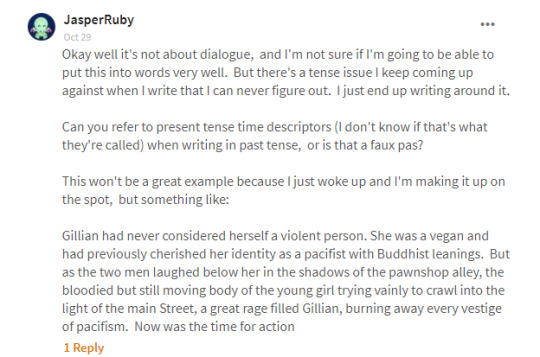
I’ve talked a bit about verb tense before, as it’s something I’ve seen people struggle with a lot (especially in amateur writing and roleplay): https://www.wattpad.com/612462156-tips-for-being-a-better-writer-verb-tenses-and-you
But there might be some value in talking a bit more about verb tenses with a greater degree of granularity, and see if we can hammer out some rules and guidelines for keeping things consistent, as well as avoiding some of the more common problems that crop up.
Okay. So First Off. What’s the Deal With Verb Tense?
So we’re all pretty well familiar with past, present and future tense, right? Those are fairly straightforward.
Where things start to get interesting (and complicated) is in the other tenses, which do a great job of delivering the time when something happened in a remarkable level of detail. For example, compare and contrast:
I walked.
I was walking.
I had walked.
I had been walking.
I was walked.
The first example is simple past tense: This is an event that began in the past and ended in the past. I think y’all know how that works.
The second example is “past progressive” or “past continuous” tense. You make it by combining “was” + an “-ing” form of a verb. Past progressive describes ongoing, continuous actions that go on in the background or which are interrupted by something else (”I was X-ing when Y happened” is a very common construction). You can see some really good examples here: https://www.ef.com/english-resources/english-grammar/past-continuous-tense/
You should think of past progressive like set pieces. They can form a great backdrop for what’s going on (the sun was shining, the birds were singing, the leaves were rustling) but they’re not really front-and-center kinds of action. You’re not going to be using these to describe the main action of your story.
The third example is “past perfect” tense, which means it describes something that happened in the past before something else that also happened in the past. You basically use it to make sense of timelines where multiple things are happening in sequential order.
For example, compare and contrast:
I saved my file before the computer crashed
vs
I had saved my file before the computer crashed.
Both describe the same event, but the second example gives more emphasis to the timing and order of events. It reads sort of plaintively, right? Like someone insisting they did it that way? You can hear the implied emphasis on the word “before” in that sentence, right? There’s also kind of an implied, unspoken (”already”) that you feel snuck in there, right? That’s the power of past perfect. Here’s a guide: https://www.ef.edu/english-resources/english-grammar/past-perfect-tense/
Not super useful in writing. But pretty useful when you’re pleading your case with your boss about how you had already cleaned the bathroom when your stupid coworker took credit for it.
The fourth example, unsurprisingly enough, is the “past perfect progressive” (or “past perfect continuous,” if you prefer), verb form. It’s what happens when #2 and #3 get smooshed together. You use it to describe things that were ongoing in the past before being interrupted by something else. So for example, compare and contrast:
I had cleaned the bathroom before Bob came into work
vs
I had been cleaning the bathroom before Bob came into work
That first example implies that cleaning the bathroom was a one-time event. The second example suggests that this was something that happened on a regular basis; you can kind of hear the implied “every day” in it, right? (and in usage, you may well include it there for clarity).
This verb conjugation creates an added layer of narrative distance, too. You’ll find yourself using it all the time when you relay information to people: “She said that she had cleaned the bathroom.”
See more examples here: https://www.grammarly.com/blog/past-perfect-continuous-tense/
The fifth example is in simple past tense, but it’s a passive verb construction. Here “was” functions as a helper to “walked,” and it means that the person speaking was walked by someone else, like a dog (or maybe in handcuffs down to a courtroom).
And just in case all of that wasn’t enough to make your head spin, bear in mind that all of these are just constructions of past tense verbs. We still have verbs in the present tense and future tense to worry about.
Fortunately, they should be pretty familiar:
I walk (I wasn’t, but then I started doing it just as soon as I said that)
I am walking (I’m doing it right now)
I have been walking (I’m doing it right now and have been doing it but that’s about to change)
I will walk (I’m not yet, but in the future I plan to)
I will have walked (I’m not right now, but I expect to by a particular point in the future)
I will have been walking (I’m doing it right now, and will continue to do it up to a point in the future)
Verb conjugation is hard. It’s one of the hardest things about learning a language. Ask me if I remember how to conjugate verbs in Spanish (spoiler alert: nope). And even native speakers of English can screw it up sometimes.
Which is, I suspect, how we end up with verb tenses that slip, especially if you’re writing something a little bit outside of your normal comfort zone. For example, if you’re new to writing, you might start slipping into the present tense because that’s how we often speak to each other. Or, if you’re used to writing in past tense but try to write in present, your verb tenses might start slipping out of habit.
In narrative writing, you don’t have to worry about weird sentence constructions all that much. 98% of your writing will be either simple past tense (describing events as they unfolded) or past progressive (laying down set pieces as a backdrop for those events to happen against). But maybe you need to write a flashback, at which point you’ll end up using a whole lot of “She had been…She had gone…She had said” unless you invoke some other literary device (like a scene break and a framing narrative) to set off the flashback from the primary action. Or maybe you need to have a character tell a story about another character’s history, and end up invoking some of those “She had been doing” verb formations.
And sometimes you’ll want to use a phrase or colloquialism that we’re only familiar with hearing in one particular verb tense and you’ll have to decide if you want to tweak the phrasing of the colloquialism (and risk losing its familiarity), or adjust the way the sentence flows around it.
So don’t throw the baby out with the conjugated bathwater here. You’ll find occasions when you need to know how to do some things, grammatically. There’s no shame in looking it up. There’s also no shame in hiring an editor (or bribing a grammar-loving friend) to help you. But as a writer, part of your job is using precise language, because form = function = meaning.
So Why Do People Screw This Up So Much?
Obviously, some people screw up verb tenses because they just don’t know better, due to a lack of education or whatever else.
But most commonly, I think people don’t always intuitively understand that writing a story uses language differently than telling a story. This is especially true for people who don’t read a lot and aren’t super familiar with literary conventions.
If I’m telling a story out loud to a friend, it’s very likely I’ll slip into present tense (”So then she turns to the bartender and is like, ‘Do you have any grapes?’ and the bartender is all ‘gdi no I told you that’) or I’ll hedge a bit and add some narrative distance (”She told me that she would have been doing it already, except she had already done that other thing”).
There’s all sorts of linguistic and sociological reasons for the differences in oral storytelling and written storytelling, and hardly enough space to get into them here – but basically it all boils down to this: Grammar is a tool like anything else, and changing the way you tell a story changes its meaning. Once you understand that, you can embrace it and use it to your advantage.
Grammar isn’t a hard-and-fast set of rules cut in stone that must never be broken. Grammar is a vehicle for meaning. Your concern in using words a particular way should be ensuring that the meaning is clear (and will be clear to the greatest number of people), and sometimes that means creatively mashing some things together.
How else do you think we ended up with all these damn verb tenses to begin with? They exist because at some point someone was telling a story and needed to make it very clear that such-and-such event happened before so-and-so started doing this other thing. And as our lifestyles continue to evolve, so to will our language usage.
So do your best, look things up when you have to, and think really hard about what specific meaning or effect you’re trying to convey. You’ll get there (and even if it’s not perfect, your reader will still follow if it’s clear. and if not, well, that’s what editors are for).
Happy writing!
72 notes
·
View notes
Text
Okay, so I played this game over the weekend and now I’m gonna write a review of it and you can’t stop me. (Screenshots taken from their store page. Thanks to @katie-foxtail for reminding me this exists. I may add my own screenshots later when I have the time. Edit: I did.)
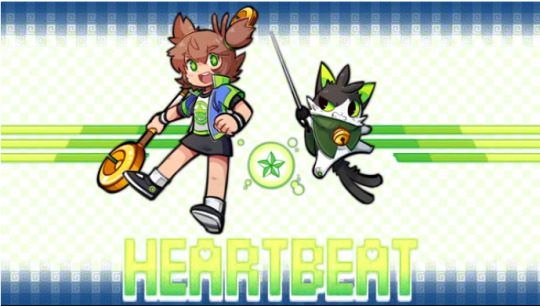
HEARTBEAT is a game with seemingly heavy Touhou influences that I’m like 95% sure was made by you Tumblrites out there. Like, the artstyle and dialog writing strongly reminds me of a certain someone whose works I’ve enjoyed in the past. I... I guess I could just cross-reference the names in the credits, but it’s hard for me to keep track of people’s names here so I don’t know what’s what.
Also they literally have a tumblr I guess.
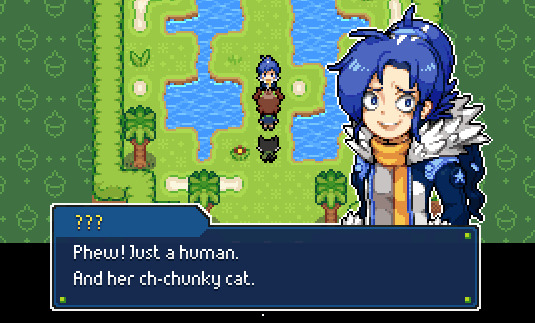
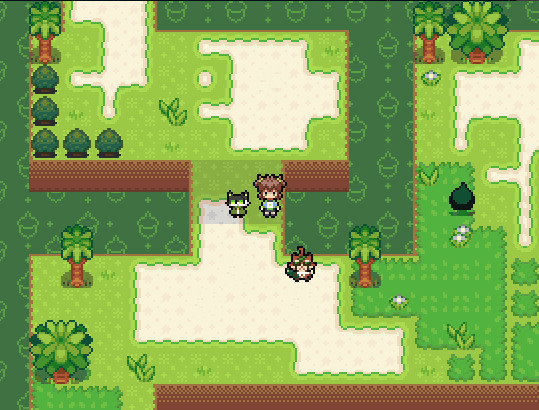
Basically it’s about a world where humans and all kinds of mythological creatures (known as Mogwai for whatever reason) live side by side, which has caused a lot of people to compare it to Pokemon. And to be fair, visually it owes a lot to Pokemon, and there’s an emphasis on humans in a modern-ish setting emotionally and spiritually bonding with their favorite Mogwai. However, unlike Pokemon, all the Mogwai can talk, and most can assume a human form, so you could also say that humans and mythological creatures living side-by-side is more Touhou than Pokemon. The Mogwai are people, not just beloved pets.
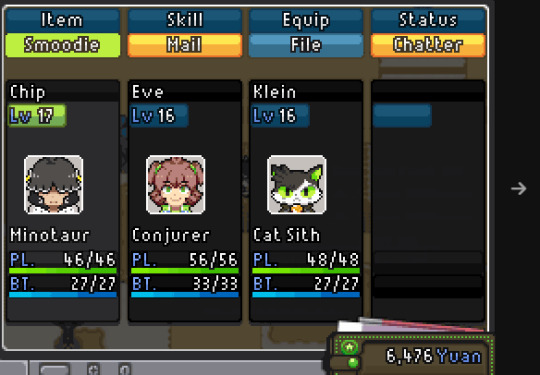
Anyway, it’s a JRPG where most of your party are anthropomorphic monsters like Minotaurs or Cat Sith. Also everyone is a girl. Like, everyone in your party and also 90% of the important NPCs. Not in like a fanservice-y way, but it’s just a casually female game. This is Touhou influence #2. I suppose it’s also worth noting that a lot of the designs are rather androgynous: the artist clearly didn’t feel a need to make everyone “girly” just because they’re women.
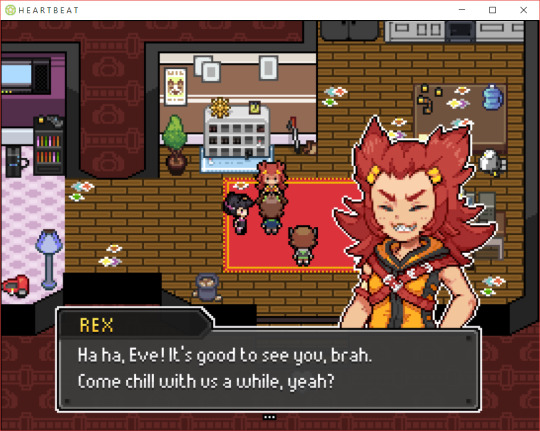
Also, and this is not at all a bad thing, this game is really really gay. Like, super gay. Again, in a casual, PG way.
I guess I should mention the plot and stuff. You play as Eve, a human “Conjurer” who was born with the ability to form pacts with Mogwai, specifically her childhood friend Klein, the Cat Sith (Klein is a girl; always remember that everyone is a girl). Conjurers are a little rare but not unusual, and Eve is basically just an ordinary 20-something working part-time in her grandfather’s grocery store. The game starts with her being sent out on an errand, and ends with her fighting to save the world. You know, normal JRPG stuff. It’s like 15 hours to reach the ending, give or take.
What I will say though is that the atmosphere is deceptively idyllic. It feels extremely Pokemon at first, with everyone constantly talking about how cute the monsters are. And it feels like nothing could ever go wrong in this world, other than perhaps comical Team Rocket escapades. But as you get further in the game, you start to see more and more tensions rising to the surface, and the world isn’t quite as idyllic as you might have thought. I found that interesting.
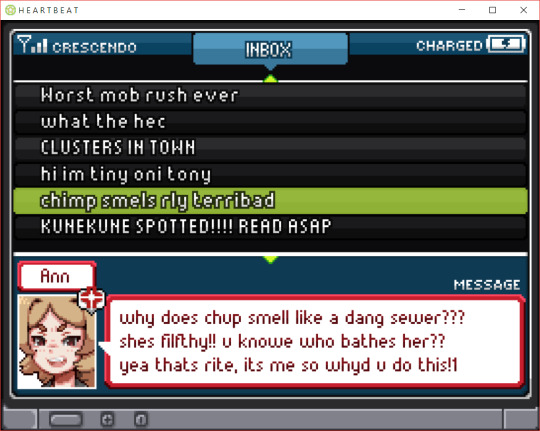
In terms of just the writing though, the dialog and descriptions are consistently silly and whimsical. Good stuff. However, I note with some disappointment that after the initial demo a lot of the more outlandish dialog has been edited down to be comprehensible, which is a great loss. Still, there’s a great use of character voice all throughout, and I especially loved how they handled some the text messages characters will send you.
Mechanically it’s closer to your standard turn-based JRPG than it is to Pokemon. You’ve got a party of four people at a time, and you take turns beating each other up in AGI order. There’s, like, a super move meter but overall everything is kept pretty simple. Buffs and debuffs are extremely important, and the game will probably smash you if you don’t use them. On hard mode I had a difficult time beating the very first random encounter, and I ended up switching it down to normal after the 2nd boss. So... it’s a game that can kick your teeth in, but that’s not a bad thing. It just means you need to pay attention to what you’re doing.
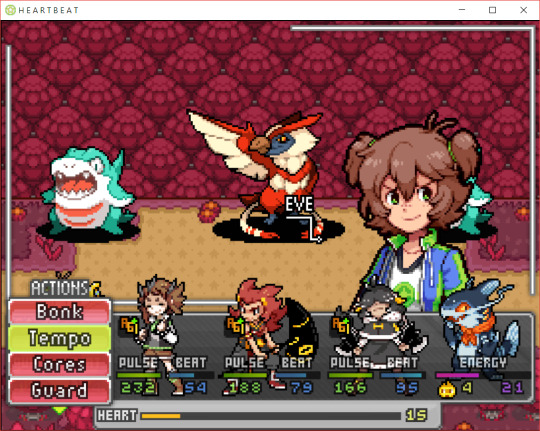
Random battles can get irritating, but it uses one of those relative EXP gain systems where you level up incredibly fast if you’re below the expected level, and incredibly slowly if you’re above, so you won’t fall behind by skipping battles.
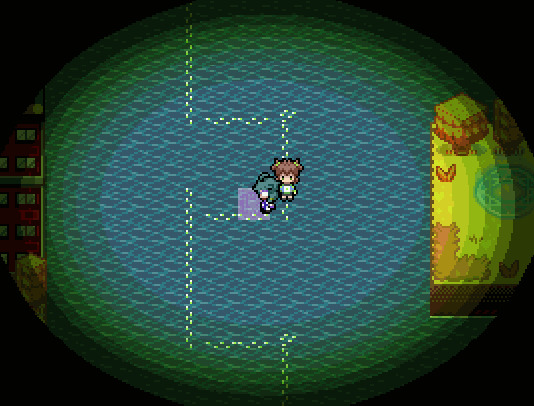
One thing I found interesting is that your party is constantly changing due to the plot, somewhat like FF4 or Grandia. Rather than gathering a huge group of people who you can switch between freely, you always have a four person party composed of whoever happens to be traveling with you at the moment. I like that, as it means you’re forced to use everyone, rather than just sticking to the ones you’ve decided are the “best” by whatever metric you’re using. In particular, since each character has an innate element that they can’t change, you’re often forced to fight at an elemental disadvantage (that’s a good thing in my twisted mind). However, it also creates an annoyance because each character has their own field ability for solving puzzles (cutting down plants or seeing hidden paths, for example), and if you’re too eager to advance the plot you can lose them and miss out on optional sidequests.
Music is good. Each character has their own boss theme (Touhou strikes again!) and in general the boss themes got me pumped up. None of them are stuck in my head though. It’s hard for me to comment on music in any more detail than that, but I certainly didn’t want to replace it with something else. There’s an amusingly musical tone to the error beeps when you try to do something you can’t do.
Overall, game is good. I like games, and I especially like it when Touhou fans move from creating fanworks to creating their own original stuff. I mean, technically I don’t know if the creators of this game were Touhou fans (that would require, like, research), but I believe in my heart that they are. It’s cool and I want to support them. HEARTBEAT is supposed to be out on Steam eventually, but you can also buy it now from the store page I linked at the top.
51 notes
·
View notes